#(for $76 in 1984 money)
Explore tagged Tumblr posts
Text
I mean they (=film studios) did also try to kill Sony over that. that was a pretty significant thing that happened.

I understand where you’re coming from here but they (=Universal) (& Disney) (& et. al) very much tried to make it impossible and/or illegal to do that.

“To protect their copyright, streaming sites do not allow for screenshotting of any kind.”
Hey remember VHS where you bought a box to plug into your tv and you could legally record whatever was playing and then own it for free forever
#it took an **8 YEAR LEGAL DISPUTE** for us to have the right to Make Home Video Recordings enshrined as law#it didn't just happen as a Natural And Easy Effect Of The Existence Of Tapes#Studios & Distributors would have rather killed the home video market as it was#than let anyone Watch A Film They Had Aired To That Person's Own TV At Any Time Besides When It Aired#anti-screenshotting measures are the Exact Same Vein Of Shit#(you know what Disney did within the year of the ruling against the anti-blank tapes brigade)#(Released the first ever Official & mass-produced home tapes of one of their animated movies)#(for $76 in 1984 money)#(eventually marked down to $30 in 1985 money)#“being able to watch our products outside of exactly when we allow it” was never itself disagreeable for the companies#or even necessarily that Someone Else Was Making Money Off The Potential To Do It#it was the fact that people could do it Without Having To Pay **Universal (& Disney) (et. al)** for the ability to do so.
80K notes
·
View notes
Text

As you would expect February 29th is a bit bereft of anniversaries, but did you know..........
Anyone born on this day is said to be unlucky in Scottish culture, and referred to as “Leaplings.” True, they don’t get to celebrate many birthdays, but to make things worse, Scottish tradition adds on another layer by saying that leaplings are doomed to a lifetime of “untold suffering.” They also consider leap years as doomed for farmers, as the saying goes: “Leap year was never a good sheep year.”
Ithink we all know that it is the day of the year a lady can traditionally propose toher man, but in Scotland women intending to propose are advised to wear a red petticoat visible to their love – perhaps to give them fair warning! ;) Tradition also stated that any man who refused a Leap Day proposal should be issued with a fine, which could range from money to silk gowns.
If you are trying to work out the math on what you're exact age would be if you were born on February 29th, then you are in luck.
1920: 104 years old or 26.
1924: 100 years old or 25.
1928: 96 years old or 24.
1932: 92 years old or 23.
1936: 88 years old or 22.
1940: 84 years old or 21.
1944: 80 years old or 20.
1948: 76 years old or 19.
1952: 72 years old or 18.
1956: 68 years old or 17.
1960: 64 years old or 16.
1964: 60 years old or 15.
1968: 56 years old or 14.
1972: 52 years old or 13.
1976: 48 years old or 12.
1980: 44 years old or 11.
1984: 40 years old or 10.
1988: 36 years old or 9.
1992: 32 years old or 8.
1996: 28 years old or 7.
2000: 24 years old or 6.
2004: 20 years old or 5.
2008: 16 years old or 4.
2012: 12 years old or 3.
2016: 8 years old or 2.
2020: 4 years old or 1.
The next leap year will take place in 2028.
2K notes
·
View notes
Text
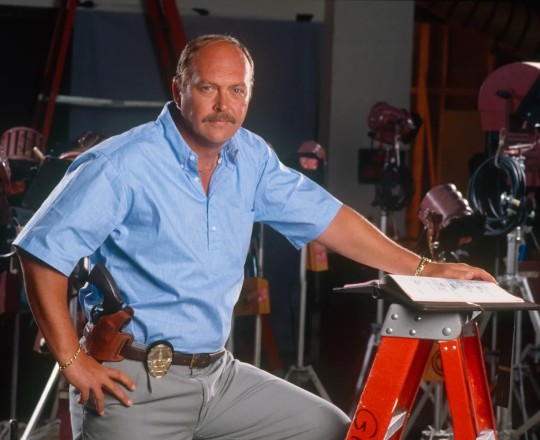
John Ashton
American actor best known for his role as Sergeant John Taggart in the Beverly Hills Cop films
In several action comedies of the 1980s, John Ashton, who has died aged 76 from cancer, played disgruntled, buffoonish or flummoxed figures caught up in chaotic situations not entirely of their own making.
The first, Beverly Hills Cop (1984), was originally intended as a dramatic vehicle for Sylvester Stallone: “Stallone was going to make it ‘Rambo Blows Up Beverly Hills’ or something,” said Ashton, who first auditioned for the film in that form.
When it was subsequently retooled for the overnight sensation Eddie Murphy, it became a comedy in which other cast members were also permitted to be funny. Among them was Ashton, who played the dyspeptic Sergeant John Taggart. With his partner, Detective Billy Rosewood (Judge Reinhold), he is assigned to keep an eye on Murphy’s irreverent Detroit native Axel Foley, who makes waves as he hunts a killer in Beverly Hills.
Foley runs rings around the pair. During a stakeout, he inserts bananas into their car’s exhaust pipe, causing the vehicle to stutter and stall when they try to follow him. Ashton’s irritability was nicely offset by Reinhold’s peppy naivety. One of the pleasures of the film was seeing Taggart gradually come around to Foley. Having begun the movie at loggerheads, they end it as allies.
After witnessing the enthusiastic response to the movie at an industry screening, Ashton and Reinhold stopped by a Los Angeles cinema a few weeks later to see how it was going down with the public. Seated in the balcony, they marvelled at the audience “hooting and hollering and screaming and yelling”.
Directed by Martin Brest and released in the US in December 1984, Beverly Hills Cop took $316m worldwide, and was one of the country’s top 10 highest grossing films in 1984 and 1985.
Ashton and Reinhold returned in Beverly Hills Cop II (1987), as well as the recent fourth instalment, Beverly Hills Cop: Axel F (2024), in which Taggart has now been promoted to police chief. “If we were gonna do [another] Beverly Hills Cop, the only way it could happen was if all of us were in it,” said Murphy earlier this year.
Less commercially successful than Beverly Hills Cop but far superior was the buddy movie Midnight Run (1988), also directed by Brest. It starred Robert De Niro as a dishevelled bounty hunter transporting a turncoat Mob accountant (Charles Grodin) across the US. Ashton was superb as the comically coarse Marvin Dorfler, a rival bounty hunter who tries repeatedly to intercept the duo and claim the money for himself. Dunderheaded the character may have been, but Ashton also showed convincingly that he could be intimidating when the need arose.
The role had been written as a straightforward heavy. “But that’s not how I played him,” said Ashton, who approached Marvin instead as someone who was simply doing his job. It worked: though the character died halfway through George Gallo’s script, Brest ordered a rewrite. “About a month in, Marty said: ‘We can’t kill Dorfler, the audience will hate us!’” Ashton recalled. He was spared and given additional scenes, including a memorable appearance during the tense climax.
Seeing Ashton square off repeatedly against De Niro was among the film’s highlights. It was also vital to him to win the role in the first place. He had arrived at the audition to find “about 30 guys in the hallway going, ‘I can’t believe I gotta read with Bobby De Niro’. Everybody’s freaking out.” Ashton, on the other hand, was champing at the bit. “Nobody’s getting this role but me,” he decided.
During the ensuing improvisation, De Niro was meant to hand him a set of keys. As he went to take them, De Niro tossed them on the floor. “Fuck you!” barked Ashton, sparking an escalating exchange of obscenities. “I know every other actor picked those up,” he reflected. He later discovered that, once he left the room, De Niro had told Brest: ‘I want him.’”
Ashton was born in Springfield, Massachusetts, to Edward and Eva (nee Wells), and raised in Enfield, Connecticut. He was educated at Enfield high school and Defiance College, Ohio, then studied theatre at the University of Southern California. In 1970 he won a scholarship to travel abroad, and appeared in theatre productions across Europe.
He always referred to theatre as his first love, and it was in that medium that he won his only prizes: a Los Angeles Drama Critics Circle award in 1973 for A Flea in Her Ear, and a Drama Logue award in 1982 for a production of Sam Shepard’s True West, in which he starred opposite Ed Harris.
His first film was the slasher thriller An Eye for an Eye (1973). He then became a familiar face with guest spots on TV shows such as Kojak, Columbo and Starsky & Hutch. In 1978 he appeared in six episodes of the soap opera Dallas as a crony called upon to do the dirty work of JR Ewing (Larry Hagman).
Film work included the acclaimed cycling drama Breaking Away (1979), the Charles Bronson thriller Borderline (1980), John Schlesinger’s chaotic comedy Honky Tonk Freeway (1981), the monster movie King Kong Lives (1986) and several John Hughes projects: Some Kind of Wonderful (1987), She’s Having a Baby (1988) and the children’s comedy Curly Sue (1991). In 1989 he played a worried father whose seven-year-old son is kidnapped in the factually based TV drama I Know My First Name is Steven (1989), and at a press conference to promote the film, tearfully recounted his childhood memories of being followed home from school by a stranger.
There was much talk of a follow-up to Midnight Run, and even a script that Ashton read but felt was not up to snuff. A trio of undistinguished sequels were eventually made for TV without the original personnel. In the first two, Another Midnight Run and Midnight Runaround (both 1994), Dorfler was played by Ed O’Ross.
Ashton worked continuously in film and television. Notable parts included a prison guard in Instinct (1999) with Anthony Hopkins and Cuba Gooding Jr, and yet another cop in Ben Affleck’s impressive thriller Gone Baby Gone (2007). Ashton’s final performance was as a judge in two forthcoming westerns: Hot Bath, Stiff Drink an’ a Close Shave and its sequel, Hot Bath an’ a Stiff Drink 2.
He is survived by his third wife, Robin Hoye, and two children, Michelle and Michael, from his previous marriages to Victoria Runn and Bridget Baker, both of which ended in divorce.
🔔 John David Ashton, actor, born 22 February 1948; died 26 September 2024
Daily inspiration. Discover more photos at Just for Books…?
12 notes
·
View notes
Text
Lucifarian Family 80s Redux: Bios:
The Princess of Greed: Nadia Lucifarian / Nadezhda Kovalchuk (1984)

The third of the seven sins, but money is the root of all evil, and those with greed can have the darkest hearts.
"I came to America with a dream, a dream of being rich."
Name
Full Legal Name: Nadezhda Lyubov Kovalchuk
First Name: Nadezhda
Meaning: Means 'Hope' in Russian and Bulgarian
Pronunciation: nu-DYEZH-da
Origin: Russian, Bulgarian
Middle Name: Lyubov
Meaning: Derived from the Slavic elements 'Lyuby' meaning 'Love'
Pronunciation: lyuw-BOF
Origin: Russian, Ukrainian, Bulgarian
Surname: Kovalchuk
Meaning: Derived from Ukrainian and Russian 'Koval' meaning 'Blacksmith'
Pronunciation: ka-vul-CHOOK
Origin: Ukrainian, Russian
Aliases: Nadia Lucifarian, The Princess of Greed, The Greedy Princess, The Greedy Nymph, The Nymph of Greed, The Voracious Nymph, The Nymph of Voraciousness, The Princess of Greed Nadia Lucifarian, The Greedy Princess Nadia Lucifarian, The Greedy Nymph Nadia Lucifarian, The Nymph of Greed Nadia Lucifarian, The Voracious Nymph Nadia Lucifarian, The Nymph of Voraciousness Nadia Lucifarian
Nicknames: Nadia, Nadya, Liouba, Luba, Lyuba, Lyubochka, Princess N, Nymph
Titles: Miss
Characteristics
Age: 28
Gender: Female. She/Her Pronouns
Race: European (Slavic) (Human)
Nationality: American
Ethnicity: Mixed (Both Sides White/Slavic) 1/2 Bulgarian 1/2 Ukrainian
Birth Date: March 18th 1956
Sexuality: Straight
Religion: Non-Religious
Native Language: Bulgarian
Spoken Languages: Bulgarian, Ukrainian, English, Spanish
Relationship Status: Single
Astrological Sign: Pisces
Theme Song: 'Money Changes Everything' - Cyndi Lauper (1983-), 'Money (That's What I Want)' - Barrett Strong (1976-1983)
Voice Actor: Lena Katina
Singing Voice: Julia Volkova
Geographical Characteristics
Birthplace: Zlatograd, Smolyan Province, Bulgaria
Current Location: On The Road
Current Residence: Albany, Albany County, New York, USA
Hometown: Zlatograd, Smolyan Province, Bulgaria
Appearance
Height: 5'5" / 165 cm
Weight: 145 lbs / 65 kg
Eye Colour: Green
Hair Colour: Ginger
Hair Dye: None
Body Hair: N/A
Facial Hair: N/A
Tattoos: 3
Piercings: Ear Lobes (Both, Triple)
Scars: None
Clothing Style: Fancy but Simple
Health and Fitness
Allergies: None
Alcoholic, Smoker, Drug User: Social Drinker
Illnesses/Disorders: None Diagnosed
Medications: None
Any Specific Diet: None
Relationships
Allies: Ves Lucifarian, Bon Lucifarian, Kat Lucifarian, Anna Lucifarian, Nora Lucifarian, Syn Lucifarian
Enemies: Moolah, Wendi Richter, Lord Alfred Hayes, Mr Fuji, Sgt Slaughter, Hulk Hogan
Mentor: Zlatan Kovalchuk
Significant Other: None
Previous Partners: None of Note
Parents: Zlatan Kovalchuk (76, Father), Alla Kovalchuk (78, Mother, Née Sobol)
Parents-In-Law: None
Siblings: Inna Popov (46, Sister, Née Kovalchuk), Vladislav Kovalchuk (43, Brother), Kalyna Medved (40, Sister, Née Kovalchuk), Vladimir Kovalchuk (37, Brother), Larisa Shvets (34, Sister, Née Kovalchuk), Tihomir Kovalchuk (31, Brother)
Siblings-In-Law: Stanislav Popov (48, Inna's Husband), Mila Kovalchuk (44, Vladislav's Wife, Née Shevchenko), Simeon Medved (42, Kalyna's Husband), Susanna Kovalchuk (38, Vladimir's Wife, Née Baran), Rumen Shvets (36, Larisa's Husband), Alma Kovalchuk (32, Tihomir's Wife, Née Sýkora)
Nieces & Nephews: Radko Popov (26, Nephew), Barbara Popov (28, Radko's Wife, Née Sokol), Božena Pokorný (23, Niece, Née Popov), Mladen Pokorný (24, Božena's Husband), Miroslav Popov (20, Nephew), Danica Popov (22, Miroslav's Wife, Née Babić), Ida Popov (17, Niece), Milan Popov (14, Nephew), Iris Popov (11, Niece), Ivan Popov (8, Nephew), Irma Popov (5, Niece), Goran Kovalchuk (23, Nephew), Laura Kovalchuk (24, Goran's Wife, Née Ziętek), Ljubica Zieliński (20, Niece, Née Kovalchuk), Emil Zieliński (22, Ljubica's Husband), Dobroslav Kovalchuk (17, Nephew), Matilda Kovalchuk (14, Niece), Daniel Kovalchuk (11, Nephew), Milica Kovalchuk (8, Niece), Borislav Kovalchuk (5, Nephew), Sabina Kovalchuk (3, Niece), Boris Medved (20, Nephew), Sanja Medved (22, Boris' Wife, Née Żbikowski), Vera Medved (17, Niece), Bogdan Medved (14, Nephew), Vesna Medved (11, Niece), Yaroslav Medved (8, Nephew), Zora Medved (5, Niece), Vsevolod Medved (3, Nephew), Adela Kovalchuk (17, Niece), Timur Kovalchuk (14, Nephew), Blažena Shvets (14, Niece), Taras Shvets (11, Nephew), Dagmar Shvets (8, Niece), Svyatoslav Shvets (5, Nephew), Darina Kovalchuk (11, Niece), Roman Kovalchuk (8, Nephew)
Children: None
Children-In-Law: None
Grandkids: None
Great Grandkids: None
Wrestling
Billed From: Hell Itself
Trainer: Zlatan Kovalchuk
Managers: Damo Lucifarian
Wrestlers Managed: None
Debut: 1976
Retired: N/A
Wrestling Style: Showman
Stables & Teams: The Lucifarian Family (1976-)
Regular Moves: Diving Crossbody, Spinning Heel Kick, Springboard Dropkick, Springboard Plancha, Onehanded Bulldog, Missile Dropkick, Gold Digger (Inverted Spinning Elbow Strike), Diamond Ring (Running Enzuigiri), Pin By Standing On Her Opponent
Finishers: Money Maker (Full Nelson Facebuster), Inheritance (Running Double-Knee Facebreaker)
Refers To Fans As: The Possessive, The Possessive Ones, The Greedy,
Commentary Name: The Nymph
Extras
Backstory: Nadezhda Kovalchuk grew up longing for a life of extravagant spending. Nadezhda was her father's 'little princess', which means she was put first when it came to spending (any) extra money her (already poor) family got, Nadezhda wanted to learn ballet, she would get lessons, Nadezhda wanted to learn archery, she got lessons, and so on. Nadezhda eventually wanted to learn how to wrestle, and she didn't need to go far to find lessons, her father (Zlatan) used to fight bears when he was a teenager, for people's entertainment. Meeting both Vesta and Bonita, in the same part of the British wrestling circuit, the three became friends fast, during that time she also met Damocles. Nadezhda was often broke due to paying for lavish items, champagne, limos, designer clothing, and so on. Nadezhda was the perfect candidate for 'Greed', being so money-hungry (with good reason), but never truly knowing how to limit her spending. She has been with the 'Lucifarian Family' since the start of her career.
Trivia:
Nadezhda is cowardly in a Jimmy Hart way, she'll piss someone off, during a promo, and run away once she feels like she's in danger
Nadezhda is a showman (Show-woman?) because she's more show than work, meaning she works exceptionally quick matches
Nadezhda's role is as the heart (and wallet) of the group
Nadezhda is Charming, Cowardly, Greedy, Loyal, Self-Confident and Vain
Nadezhda knows how to keep herself out of harm's way
Nadezhda can keep a close group of friends together
Nadezhda can sort out differences between people quite easily
Nadezhda is very hard to plan simple matches for
Nadezhda is even harder to get to participate in tougher, more challenging matches
Nadezhda cares more for money than people deep down
Nadezhda likes: Money, Sunrises, Cruises, Yellow, Holubtsi (Ukrainian boiled cabbage packages), Kupala Night, New Year's Eve, Poison Dart Frogs, Limos, Sunflowers, Champagne, Dresses, Winter Coats, Poetry, Moor Frogs
Nadezhda dislikes: Government, Black Ice, Museums, Neon colours, Beer, Christmas, 4th of July, Bears, Sunsets, Orchids, Hail (Weather), Short skirts, Ripped clothing, Caves, Giant suids,
Nadezhda's named moves are jokes on the fact that she is greed, such as Gold Digger and Diamond Ring. However, Money Maker is also a joke on the fact that it's a facebuster, and usually an actor's face is called their 'money maker'
Nadezhda hates Hulk Hogan and Sgt Slaughter, because of how patriotic they are


Left: Nadezhda in 'Human form' (With her natural brown eyes)
Right: Nadia in 'Demon form' (With yellow eyes)
2 notes
·
View notes
Text
Average spending per pupil is approaching that of independent schools. Rather than the lack of resources, the reason for poor performance lies in the structure of the education system. In the absence of parental choice, British schools have been subjected to increasingly strong direction from central government. While the aim was to achieve a minimum level of achievement for all children, the result has been persistently low standards, inequity and burdensome regulation Research (Oct,2005) done by the independent think tank Reform shows that radical education reform, based on allowing parents to choose either state or independent schools at the taxpayers' expense, is supported by a half of all voters and would create thousands of new schools. A Reform study, The potential benefits of real education reform in England, includes detailed research into the system of school choice in Sweden, held up last week by the former Minister Alan Milburn as a model for the forthcoming White Paper on secondary education. Sweden has seen a dramatic increase in the number of taxpayer-funded independent schools in all areas of the country, including rural and deprived areas. If the Swedish experience was replicated in England, real reform would lead to over 3,500 new schools in twelve years. Reform also released an ICM poll on education reform. . If the Swedish experience was replicated in England, real reform would lead to over 3,500 new schools in twelve years.Reform also released an ICM poll on education reform. It shows that 76 per cent of voters think that state education is in need of a fundamental review and 49 per cent support choice of both state and independent schools on the Swedish model. A majority of 18-34 year-olds support radical reform.The study shows that the Government's general election manifesto gives it the mandate it needs to introduce radical reform. But unless the key principle of reform is accepted - that taxpayers' money can follow parental choice freely into the independent sector, allowing new schools to open according to parental demand rather than Local Education Authority decision - any change will be slow and any improvement limited. The Reform report shows:1. The Prime Minister and other senior Labour figures have said that a key objective for this Parliament is to increase the number and variety of state schools in England. They have argued for barriers to the opening of schools to be removed and for new schools to be run by private and voluntary providers.2. This objective is right. At present the provision of schools and school places is not demand-led by parents but centrally planned by Local Education Authorities. The effect of planning decisions over the last two decades has been to reduce the number of schools and to limit the choices available for parents. Since 1984, the total number of state schools has fallen by 13 per cent (a fall of 3,267 schools) in a time of rising pupil numbers.Prime Minister and other senior Labour figures have made clear that a key aim oftheir policy for Parliament is to increase the number and variety of state schools Read the full article
0 notes
Text
Events 11.25 (after 1920)
1926 – The deadliest November tornado outbreak in U.S. history kills 76 people and injures more than 400. 1936 – In Berlin, Germany and Japan sign the Anti-Comintern Pact, agreeing to consult on measures "to safeguard their common interests" in the case of an unprovoked attack by the Soviet Union against either nation. 1941 – HMS Barham is sunk by a German torpedo during World War II. 1943 – World War II: Statehood of Bosnia and Herzegovina is re-established at the State Anti-fascist Council for the National Liberation of Bosnia and Herzegovina. 1947 – Red Scare: The "Hollywood Ten" are blacklisted by Hollywood movie studios. 1947 – New Zealand ratifies the Statute of Westminster and thus becomes independent of legislative control by the United Kingdom. 1950 – The Great Appalachian Storm of 1950 impacts 22 American states, killing 353 people, injuring over 160, and causing US$66.7 million in damages (1950 dollars). 1952 – Agatha Christie's murder-mystery play The Mousetrap opens at the Ambassadors Theatre in London's West End after a premiere in Nottingham, UK. It will become the longest continuously running play in history. 1952 – Korean War: After 42 days of fighting, the Battle of Triangle Hill ends in a Chinese victory. American and South Korean units abandon their attempt to capture the "Iron Triangle". 1958 – French Sudan gains autonomy as a self-governing member of the French Community. 1960 – The Mirabal sisters of the Dominican Republic are assassinated. 1963 – State funeral of John F. Kennedy; after lying in state at the United States Capitol, a Requiem Mass takes place at Cathedral of St. Matthew the Apostle and the President is buried at Arlington National Cemetery. 1968 – The Old Student House in Helsinki, Finland is occupied by a large group of University of Helsinki students. 1970 – In Japan, author Yukio Mishima and one compatriot commit ritualistic seppuku after an unsuccessful coup attempt. 1973 – Georgios Papadopoulos, head of the military Regime of the Colonels in Greece, is ousted in a hardliners' coup led by Brigadier General Dimitrios Ioannidis. 1975 – Coup of 25 November 1975, a failed military coup d'état carried out by Portuguese far-left activists, who hoped to hijack the Portuguese transition to democracy in favor of the establishment of a communist dictatorship. 1975 – Suriname gains independence from the Netherlands. 1977 – Former Senator Benigno Aquino Jr., is found guilty by the Philippine Military Commission No. 2 and is sentenced to death by firing squad. He is later assassinated in 1983. 1980 – Sangoulé Lamizana, president of Upper Volta, is ousted from power in a coup d'état led by Colonel Saye Zerbo. 1981 – Pope John Paul II appoints Joseph Cardinal Ratzinger (the future Pope Benedict XVI) Prefect of the Congregation for the Doctrine of the Faith. 1984 – Thirty-six top musicians gather in a Notting Hill studio and record Band Aid's "Do They Know It's Christmas?" in order to raise money for famine relief in Ethiopia. 1985 – A Soviet Air Force Antonov An-12 is shot down near Menongue in Angola's Cuando Cubango Province, killing 21. 1986 – Iran–Contra affair: U.S. Attorney General Edwin Meese announces that profits from covert weapons sales to Iran were illegally diverted to the anti-communist Contra rebels in Nicaragua. 1986 – The King Fahd Causeway is officially opened in the Persian Gulf. 1987 – Typhoon Nina pummels the Philippines with category 5 winds of 265 km/h (165 mph) and a surge that destroys entire villages. At least 1,036 deaths are attributed to the storm. 1992 – The Federal Assembly of Czechoslovakia votes to split the country into the Czech Republic and Slovakia, with effect from January 1, 1993. 1999 – A five-year-old Cuban boy, Elián González, is rescued by fishermen while floating in an inner tube off the Florida coast.
0 notes
Photo
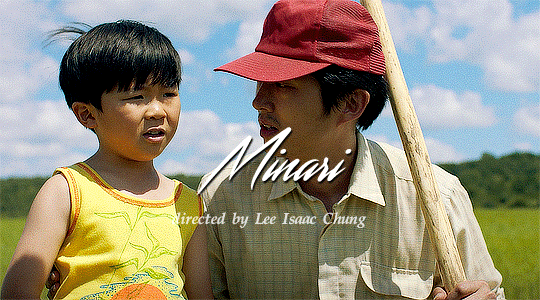
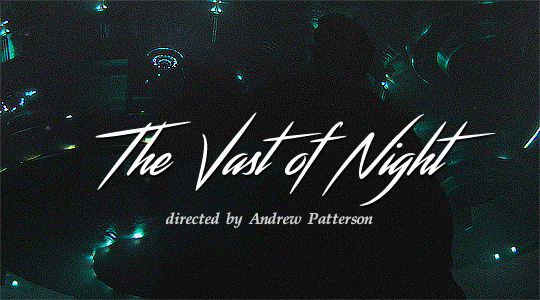
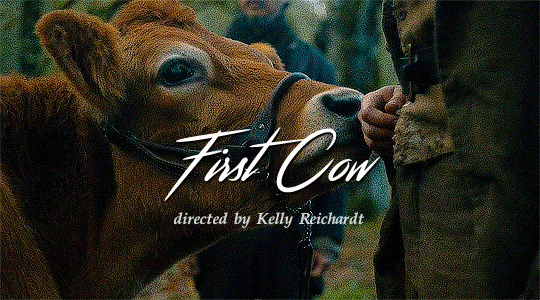
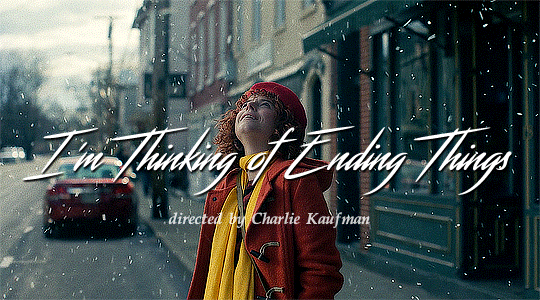


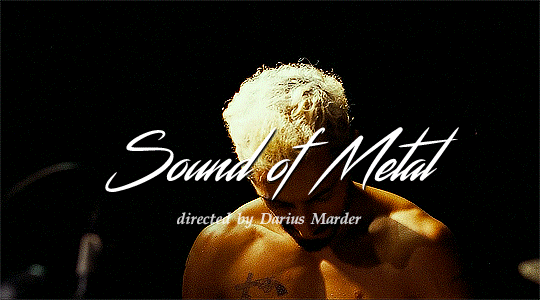




LETTERBOXD
Note: This will include a few releases from 2021 due to the pandemic/awards season 1. Minari 2. The Vast of Night 3. First Cow 4. I’m Thinking of Ending Things 5. The Forty-Year-Old Version 6. Palm Springs 7. Sound of Metal 8. Black Bear 9. Nomadland 10. One Night in Miami…
[Grade A]
11. Bull 12. Boys State 13. Never Rarely Sometimes Always 14. Tenet 15. The White Tiger 16. Let Him Go 17. Mogul Mowgli 18. Judas and the Black Messiah 19. His House 20. The King of Staten Island 21. Wendy 22. Mangrove 23. Pieces of a Woman 24. Possessor 25. VFW 26. The Short History of the Long Road 27. The Mauritanian 28. The Platform 29. You Cannot Kill David Arquette 30. The Lodge 31. Swallow 32. Soul 33. Wolfwalkers 34. Run 35. The World to Come 36. Time 37. Ma Rainey’s Black Bottom 38. Bacurau 39. The Assistant 40. Big Time Adolescence 41. I Care a Lot 42. MLK/FBI 43. The Other Lamb 44. FP2: Beats of Rage 45. The Father 46. Saint Maud 47. Mank 48. The Trial of the Chicago 7 49. Our Friend 50. Sweetheart 51. Birds of Prey (and the Fantabulous Emancipation of One Harley Quinn) 52. Hamilton 53. The Rental 54. 1BR 55. Guns Akimbo 56. Alone 57. Proxima 58. Host 59. Ordinary Love 60. Greenland
Click Keep Reading For My Full List
[Grade B]
61. I’m Your Woman 62. Promising Young Woman 63. Bad Education 64. La Llorona 65. Another Round 66. Valley Girl 67. Skylines 68. Malcolm & Marie 69. A Shaun the Sheep Movie: Farmageddon 70. The Invisible Man 71. Da 5 Bloods 72. Underwater 73. The Way Back 74. Color Out of Space 75. Happiest Season 76. The Croods: A New Age 77. Nocturne 78. Love and Monsters 79. Superman: Man of Tomorrow 80. Sputnik 81. Enola Holmes 82. News of the World 83. Project Power 84. The Wolf of Snow Hollow 85. Hammer 86. The Empty Man 87. Bad Trip 88. Borat Subsequent Moviefilm 89. The Quarry 90. The Bee Gees: How Can You Mend a Broken Heart 91. Vampires vs. the Bronx 92. Shadow in the Cloud
[Grade C]
93. Eurovision Song Contest: The Story of Fire Saga 94. The Personal History of David Copperfield 95. Bad Hair 96. Superman: Red Son 97. Scoob! 98. Land 99. On the Rocks 100. The Photograph 101. An American Pickle 102. Lost Girls & Love Hotels 103. The Broken Hearts Gallery 104. Summerland 105. Sonic the Hedgehog 106. We Summon the Darkness 107. The Beach House 108. Relic 109. Gretel & Hansel 110. Freaky 111. The United States vs. Billie Holiday 112. Black Box 113. Peninsula 114. Rebecca 115. Impractical Jokers: The Movie 116. Class Action Park 117. Downhill 118. Extraction 119. The Devil All the Time 120. The Gentlemen 121. Let Them All Talk 122. The Dark and the Wicked 123. Kajillionaire 124. Come Play 125. The Little Things 126. Unhinged 127. Dreamland 128. The SpongeBob Movie: Sponge on the Run 129. Happy Happy Joy Joy: The Ren & Stimpy Story 130. Bad Boys for Life 131. Vivarium 132. Blood Machines 133. Hubie Halloween 134. Onward 135. The Hunt 136. Ammonite 137. The Lovebirds 138. Amulet 139. The Witches 140. Fatman 141. The High Note 142. Blood Quantum 143. Cherry 144. The New Mutants
[Grade D]
145. Irresistible 146. Ava 147. You Should Have Left 148. Last Moment of Clarity 149. Justice League Dark: Apokolips War 150. Evil Eye 151. Emma. 152. The Old Guard 153. Shirley 154. The Rhythm Section 155. Bill & Ted Face the Music 156. Arkansas 157. Greed 158. Becky 159. My Spy 160. Mulan 161. Mortal Kombat Legends: Scorpion’s Revenge 162. Antebellum 163. The Tax Collector 164. Greyhound 165. Hillbilly Elegy 166. The Banker 167. Trolls World Tour 168. The Jesus Rolls 169. The Call of the Wild 170. Deathstroke: Knights & Dragons 171. The Midnight Sky
[Grade F]
172. Wonder Woman 1984 173. All My Life 174. The War with Grandpa 175. Force of Nature 176. The Night Clerk 177. The Iron Mask 178. Chick Fight 179. The Babysitter: Killer Queen 180. Capone 181. The Grudge 182. Songbird 183. Bloodshot 184. Monster Hunter 185. Above Suspicion 186. Jiu Jitsu 187. Blue Story 188. The Turning 189. Brahms: The Boy II 190. Dolittle
[Bottom 10]
191. Seberg 192. Like a Boss 193. Artemis Fowl 194. Fatale 195. Fantasy Island 196. The Lie 197. Homeward 198. Money Plane 199. Music 200. A Fall From Grace
#kane52630#filmedit#top 10 2020#filmgifs#doyouevenfilm#fyeahmovies#userrobin#usermichi#userksusha#cinemaspam#userel#userbritney#userangela#chewieblog#bblecher#movieedit#top 10 year#gifs#movie#minari#the vast of night#first cow#i'm thinking of ending things#the forty-year-old version#palms springs#sound of metal#black bear#nomandland#one night in miami
7K notes
·
View notes
Text
Leaked notes obtained by the Telegraph say that when Theresa May asked for Trump to take a strong stand after Russia poisoned Sergei Skripal, Trump replied “I’d rather follow than lead.”
Everybody works for somebody; we all know who Donald works for now. There is no benefit for him in this behavior because it doesn’t help his base or his donors, so he must owe Putin big time for something else. He’s been funded by Russian money since 1984:
Trump was over a billion in debt and the Russians bailed him out.
► Trump was first compromised by the Russians in the 80s. In 1984, the Russian Mafia began to use Trump real estate to launder money. In 1987, the Soviet ambassador to the United Nations, Yuri Dubinin, arranged for Trump and his then-wife, Ivana, to enjoy an all-expense-paid trip to Moscow to consider possible business prospects. Only seven weeks after his trip, Trump ran full-page ads in the Boston Globe, the NYT and WaPO calling for, in effect, the dismantling of the postwar Western foreign policy alliance. The whole Trump/Russian connection started out as laundering money for the Russian mob through Trump's real estate, but evolved into something far bigger.
► In 1984, David Bogatin — a convicted Russian mobster and close ally of Semion Mogilevich, a major Russian mob boss — met with Trump in Trump Tower right after it opened. Bogatin bought five condos from Trump at that meeting. Those condos were later seized by the government, which claimed they were used to launder money for the Russian mob. (NY Times, Apr 30, 1992)
► Felix Sater is a Russian-born former mobster, and former managing director of NY real estate conglomerate Bayrock Group LLC located on the 24th floor of Trump Tower. He is a convict who became a govt cooperator for the FBI and other agencies. He grew up with Michael Cohen--Trump's former "fixer" attorney. Cohen's family owned El Caribe, which was a mob hangout for the Russian Mafia in Brooklyn. Cohen had ties to Ukrainian oligarchs through his in-laws and his brother's in-laws. Felix Sater's father had ties to the Russian mob. This goes back more than 30 years.
► Trump was $4 billion in debt after his Atlantic City casinos went bankrupt. No U.S. bank would touch him. Then foreign money began flowing in through Bayrock (mentioned above). Bayrock was run by two investors: Tevfik Arif, a Kazakhstan-born former Soviet official who drew on bottomless sources of money from the former Soviet republic; and Felix Sater, a Russian-born businessman who had pleaded guilty in the 1990s to a huge stock-fraud scheme involving the Russian mafia. Bayrock partnered with Trump in 2005 and poured money into the Trump organization under the legal guise of licensing his name and property management.
► In July 2008, the height of the housing bust, Trump sold a mansion in Palm Beach for $95 million to Dmitry Rybolovlev, a Russian oligarch. Trump had purchased it four years earlier for $41.35 million. The sale price was nearly $54 million more than Trump had paid for the property. Again, this was the height of the recession when all other property had plummeted in value.
► Semion Mogilevich was the brains behind the Russian Mafia. Mogilevich operatives have been using Trump real estate for decades to launder money. That means Russian Mafia operatives have been part of his fortune for years. Many of them owned condos in Trump Towers and other properties. They were running operations out of Trump's crown jewel.
► From Craig Unger's AMA: "Early on, a source told me that all this was tied to Semion Mogilevich, the powerful Russian mobster. I had never even heard of him, but I immediately went to a database that listed the owners of all properties in NY state and looked up all the Trump properties. Every time I found a Russian sounding name, I would Google, and add Mogilevich. When you do investigative reporting, you anticipate drilling a number of dry holes, but almost everyone I googled turned out to be a Russian mobster. Again and again. If you know New York you don't expect Trump Tower to be a high crime neighborhood, but there were far too many Russian mobsters in Trump properties for it to be a coincidence."
► So many Russians bought Trump apartments at his developments in Florida that the area became known as Little Moscow. The developers of two of his hotels were Russians with significant links to the Russian mob. The late leader of that mob in the United States, Vyacheslav Kirillovich Ivankov, was living at Trump Tower
► According to a Bloomberg investigation (3/16/2017) into Trump World Tower, “a third of units sold on floors 76 through 83 by 2004 involved people or limited liability companies connected to Russia and neighboring states.”
► In 2013, Federal agents busted an “ultraexclusive, high-stakes, illegal poker ring” run by Russian gangsters out of Trump Tower. They operated card games, illegal gambling websites, and a global sports book and laundered more than $100 million. A condo directly below one owned by Trump reportedly served as HQ for a “sophisticated money-laundering scheme” connected to Semion Mogilevich.
► The Russia Mafia is part and parcel of Russian intelligence. Russia is a mafia state. that is not a metaphor. Putin is head of the Mafia. So the fact that they have been operating out of the home of the president of the United States is deeply disturbing.
► Rudy Giuliani famously prosecuted the Italian mob while he was a federal prosecutor, yet the Russian mob was allowed to thrive. Now he's deeply entwined in the business of Trump and Russian oligarchs. Giuiani appointed Semyon Kislin to the NYC Economic Development Council in 1990, and the FBI described Kislin as having ties tot he Russian mob. Of course, it made good political sense for Giuliani to get headlines for smashing the Italian mob.
► A lot of Republicans in Washington are implicated. Boatloads of Russian money went to the GOP--often in legal ways. The NRA got as much as $70M from Russia, then funneled it to the GOP. The Republican Senatorial Campaign Committee lead by McConnel got millions from Leonard Blavatnik. In the 90s, the Russians began sending money to top GOP leaders, like Speaker of the House Tom Delay. Unger's book alleges that most of the GOP leadership has been compromised by RU money.
► At the Cityscape USA’s Bridging US and the Emerging Real Estate Markets Conference held in Manhattan, on September 9, 10, and 11, 2008, Trump Jr. was frank about the tide of Russian money supporting the family business, saying "...And in terms of high-end product influx into the US, Russians make up a pretty disproportionate cross-section of a lot of our assets."
► Eric Trump told golf reporter James Dodson in 2014 that the Trump Organization was able to expand during the financial crisis because “We don’t rely on American banks. We have all the funding we need out of Russia.”
► Russian oligarchs co-signed Trump’s Deutsche bank loans.
Trump now gleefully takes cues from Putin:
► At the end of 2018, Putin and his allies started making a strong push for a resolution that would justify their country’s 1979 invasion of Afghanistan and reverse an 1989 vote backed by Mikhail Gorbachev that condemned it. The Putinists’ goal was to pass the resolution by Feb. There is no one on this side of the Atlantic who thinks the USSR was justified in invading Afghanistan. And out of nowhere, on January 2nd, Trump came out strongly supporting Russia's 1979 invasion of Afghanistan.
► Trump went against American intelligence on North Korean missiles. He told the FBI he didn't believe their intelligence because Putin told him otherwise. "I don't care, I believe Putin"
► Trump met in secret with Putin the G20 summit in November 2018, without note takers. 19 days later, he announced a withdrawal from Syria. As a note, Trump conducted FIVE completely private meetings and conferences with Putin, and has gone to great lengths to prevent literally anyone, even people in his administration, from learning what was discussed.
► Trump refused to enforce sanctions legally codified into law - and in some cases reversed standing sanctions on Russian companies.
► He has denounced his own intelligence agencies in a press conference with Putin on election meddling - and publicly endorsed Putin's version of events.
► Trump pulled out of the INF treaty with no explanation, which allows Putin to create long-range hypersonic missiles that threaten Europe with impunity. The US already has all the weaponry that the INF would ban the development of, so this offers us literally nothing, while allowing Russia to develop powerful new weapons to challenge our allies.
► Demanded Russia get invited back into G7
► Pushed the CIA to give American intelligence to the Kremlin.
► Withdrew from the Open Skies treaty
► Received intelligence in 2019 that Russia was paying bounties for dead American soldiers, and hasn't done anything about it by the time of this writing.
► Announced troop withdrawal from Germany (America's missile defense from Russia and forward operating base against Russian aggression)
► And of course, Trump continues to threaten to pull out of NATO, a move so catastrophically stupid, so inconceivably cosmically myopic, I truly can't express the profundity of the idiocy. Suffice to say, pulling out of NATO would be like the only guy in a prison yard with a shotgun just throwing it over the fence for absolutely no reason, suddenly giving the people with crude homemade shivs complete power.
#potus#Trump#donaldtrump#the donald#donald trump#donald j#trumps america#trump taxes#president trump#trump administration#corrupt#corruption#political corruption#corrupt politics
61 notes
·
View notes
Text
The Best Films of 2020
I can’t tell you anything novel or insightful about this year that has been stolen from our lives. I watched zero of these films in a theater, and I watched most of them half-asleep in moments that I stole from my children. Don’t worry, there are some jokes below.
GARBAGE
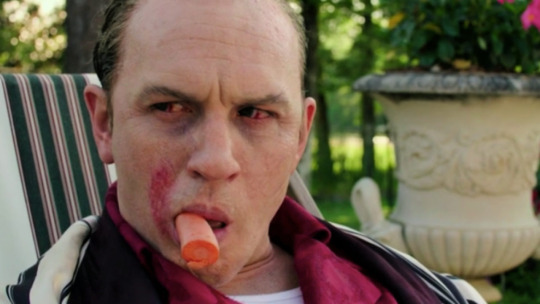
93. Capone (Josh Trank)- What is the point of this dinner theater trash? It takes place in the last year of Capone's life, when he was released from prison due to failing health and suffered a stroke in his Florida home. So it covers...none of the things that make Al Capone interesting? It's not historically accurate, which I have no problem with, but if you steer away from accuracy, then do something daring and exciting. Don't give me endless scenes of "Phonse"--as if the movie is running from the very person it's about--drawing bags of money that promise intrigue, then deliver nothing in return.
That being said, best "titular character shits himself" scene since The Judge.
92. Ammonite (Francis Lee)- I would say that this is the Antz to Portrait of a Lady on Fire's A Bug's Life, but it's actually more like the Cars 3 to Portrait of a Lady on Fire's Toy Story 1.
91. Ava (Tate Taylor)- Despite the mystery and inscrutability that usually surround assassins, what if we made a hitman movie but cared a lot about her personal life? Except neither the assassin stuff nor the family stuff is interesting?
90. Wonder Woman 1984 (Patty Jenkins)- What a miscalculation of what audiences loved about the first and wanted from the sequel. WW84 is silly and weightless in all of the ways that the first was elegant and confident. If the return of Pine is just a sort of phantom representation of Diana's desires, then why can he fly a real plane? If he is taking over another man's soul, then, uh, what ends up happening to that guy? For that matter, why is it not 1984 enough for Ronald Reagan to be president, but it is 1984 enough for the president to have so many Ronald Reagan signifiers that it's confusing? Why not just make a decision?
On paper, the me-first values of the '80s lend themselves to the monkey's paw wish logic of this plot. You could actually do something with the Star Wars program or the oil crisis. But not if the setting is played for only laughs and the screenplay explains only what it feels like.
89. Babyteeth (Shannon Murphy)- In this type of movie, there has to be a period of the Ben Mendelsohn character looking around befuddled about the new arrangement and going, "What's this now--he's going to be...living with us? The guy who tried to steal our medication? This is crazy!" But that's usually ten minutes, and in this movie it's an hour. I was so worn out by the end.
88. You Should Have Left (David Koepp)- David Koepp wrote Jurassic Park, so he's never going to hell, but how dare he start caring about his own mystery at the hour mark. There's a forty-five minute version of this movie that could get an extra star from me, and there's a three-hour version of Amanda Seyfried walking around in athleisure that would get four stars from me. What we actually get? No thanks.
87. Black Is King (Beyonce, et al.)- End your association with The Lion King, Bey. It has resulted in zero bops.
ADMIRABLE FAILURES
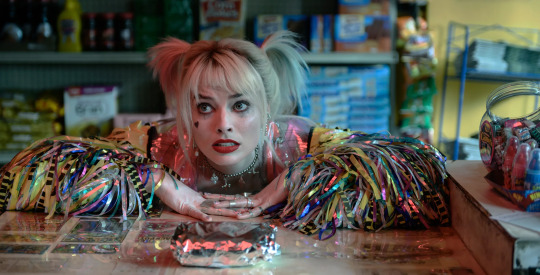
86. Birds of Prey (And the Fantabulous Emancipation of One Harley Quinn) (Cathy Yan)- There's nothing too dysfunctional in the storytelling or performances, but Birds of Prey also doesn't do a single thing well. I would prefer something alive and wild, even if it were flawed, to whatever tame belt-level formula this is.
85. The Turning (Floria Sigismondi)- This update of The Turn of the Screw pumps the age of Miles up to high school, which creates some horny creepiness that I liked. But the age of the character also prevents the ending of the novel from happening in favor of a truly terrible shrug. I began to think that all of the patience that the film showed earlier was just hesitance for its own awful ending.
I watched The Turning as a Mackenzie Davis Movie Star heat check, and while I'm not sure she has the magnetism I was looking for, she does have a great teacher voice, chastening but maternal.
84. Bloodshot (David Wilson)- A whole lot of Vin Diesel saying he's going to get revenge and kill a bunch of dudes; not a whole lot of Vin Diesel actually getting revenge and killing a bunch of dudes.
83. Downhill (Nat Faxon and Jim Rash)- I was an English major in college, which means I ended up locking myself into literary theories that, halfway through the writing of an essay, I realized were flawed. But rather than throw out the work that I had already proposed, I would just keep going and see if I could will the idea to success.
So let's say you have a theory that you can take Force Majeure by Ruben Ostlund, one of the best films of its year, and remake it so that its statement about familial anxiety could apply to Americans of the same age and class too...if it hadn't already. And maybe in the first paragraph you mess up by casting Will Ferrell and Julia Louis-Dreyfus, people we are conditioned to laugh at, when maybe this isn't that kind of comedy at all. Well, don't throw it away. You can quote more--fill up the pages that way--take an exact shot or scene from the original. Does that help? Maybe you can make the writing more vigorous and distinctive by adding a character. Is that going to make this baby stand out? Maybe you could make it more personal by adding a conclusion that is slightly more clever than the rest of the paper?
Or perhaps this is one you're just not going to get an A on.
82. Hillbilly Elegy (Ron Howard)- I watched this melodrama at my mother's encouragement, and, though I have been trying to pin down her taste for decades, I think her idea of a successful film just boils down to "a lot of stuff happens." So in that way, Ron Howard's loss is my gain, I guess.
There is no such thing as a "neutral Terminator."
81. Relic (Natalie Erika James)- The star of the film is Vanessa Cerne's set decoration, but the inert music and slow pace cancel out a house that seems neglected slowly over decades.
80. Buffaloed (Tanya Wexler)- Despite a breathless pace, Buffaloed can't quite congeal. In trying to split the difference between local color hijinks and Moneyballed treatise on debt collection, it doesn't commit enough to either one.
Especially since Zoey Deutch produced this one in addition to starring, I'm getting kind of worried about boo's taste. Lot of Two If by Seas; not enough While You Were Sleepings.
79. Like a Boss (Miguel Arteta)- I chuckled a few times at a game supporting cast that is doing heavy lifting. But Like a Boss is contrived from the premise itself--Yeah, what if people in their thirties fell out of friendship? Do y'all need a creative consultant?--to the escalation of most scenes--Why did they have to hide on the roof? Why do they have to jump into the pool?
The movie is lean, but that brevity hurts just as much as it helps. The screenplay knows which scenes are crucial to the development of the friendship, but all of those feel perfunctory, in a different gear from the setpieces.
To pile on a bit: Studio comedies are so bare bones now that they look like Lifetime movies. Arteta brought Chuck & Buck to Sundance twenty years ago, and, shot on Mini-DV for $250,000, it was seen as a DIY call-to-bootstraps. I guarantee that has more setups and locations and shooting days than this.
78. Eurovision Song Contest: The Story of Fire Saga (David Dobkin)- Add Dan Stevens to the list of supporting players who have bodied Will Ferrell in his own movie--one that he cared enough to write himself.
Like Downhill, Ferrell's other 2020 release, this isn't exactly bad. It's just workmanlike and, aside from the joke about Demi Lovato's "uninformed" ghost, frustratingly conventional.
77. The Traitor (Marco Bellochio)- Played with weary commitment by Pierfrancesco Favino, Tomasso Buscetta is "credited" as the first informant of La Cosa Nostra. And that sounds like an interesting subject for a "based on a true story" crime epic, right? Especially when you find out that Buscetta became a rat out of principle: He believed that the mafia to which he had pledged his life had lost its code to the point that it was a different organization altogether.
At no point does Buscetta waver or even seem to struggle with his decision though, so what we get is less conflicted than that description might suggest. None of these Italian mob movies glorify the lifestyle, so I wasn't expecting that. But if the crime doesn't seem enticing, and snitching on the crime seems like forlorn duty, and everything is pitched with such underhanded matter-of-factness that you can't even be sure when Buscetta has flipped, then what are we left with? It was interesting seeing how Italian courts work, I guess?

76. Kajillionaire (Miranda July)- This is another movie so intent on building atmosphere and lore that it takes too long to declare what it is. When the protagonist hits a breaking point and has to act, she has only a third of a film to grow. So whispery too.
Gina Rodriguez is the one to inject life into it. As soon as her motormouth winds up, the film slips into a different gear. The atmosphere and lore that I mentioned reeks of artifice, but her character is believably specific. Beneath a basic exterior is someone who is authentically caring but still morally compromised, beholden to the world that the other characters are suspicious of.
75. Scoob! (Tony Cervone)- The first half is sometimes clever, but it hammers home the importance of friendship while separating the friends.
The second half has some positive messaging, but your kids' movie might have a problem with scale if it involves Alexander the Great unlocking the gates of the Underworld.
My daughter loved it.
74. The Lovebirds (Michael Showalter)- If I start talking too much about this perfectly fine movie, I end up in that unfair stance of reviewing the movie I wanted, not what is actually there.* As a fan of hang-out comedies, I kind of resent that any comedy being made now has to be rolled into something more "exciting," whether it's a wrongfully accused or mistaken identity thriller or some other genre. Such is the post-Game Night world. There's a purposefully anti-climactic note that I wish The Lovebirds had ended on, but of course we have another stretch of hiding behind boats and shooting guns. Nanjiani and Rae are really charming leads though.
*- As a New Orleanian, I was totally distracted by the fake aspects of the setting too. "Oh, they walked to Jefferson from downtown? Really?" You probably won't be bothered by the locations.
73. Sonic the Hedgehog (Jeff Fowler)- In some ways the storytelling is ambitious. (I'm speaking for only myself, but I'm fine with "He's a hedgehog, and he's really fast" instead of the owl mother, teleportation backstory. Not everything has to be Tolkien.) But that ambition doesn't match the lack of ambition in the comedy, which depends upon really hackneyed setups and structures. Guiding Jim Carrey to full alrighty-then mode was the best choice anyone made.
72. Malcolm & Marie (Sam Levinson)- The stars move through these long scenes with agility and charisma, but the degree of difficulty is just too high for this movie to reach what it's going for.
Levinson is trying to capture an epic fight between a couple, and he can harness the theatrical intensity of such a thing, but he sacrifices almost all of the nuance. In real life, these knock-down-drag-outs can be circular and indirect and sad in a way that this couple's manipulation rarely is. If that emotional truth is all this movie is trying to achieve, I feel okay about being harsh in my judgment of how well it does that.
71. Beanpole (Kantemir Balagov)- Elusive in how it refuses to declare itself, forthright in how punishing it is. The whole thing might be worth it for a late dinner scene, but I'm getting a bit old to put myself through this kind of misery.
70. The Burnt Orange Heresy (Giuseppe Capotondi)- Silly in good ways until it's silly in bad ways. Elizabeth Debicki remains 6'3".
69. Everybody’s Everything (Sebastian Jones and Ramez Silyan)- As a person who listened to Lil Peep's music, I can confidently say that this documentary is overstating his greatness. His death was a significant loss, as the interview subjects will all acknowledge, but the documentary is more useful as a portrait of a certain unfocused, rapacious segment of a generation that is high and online at all times.
68. The Witches (Robert Zemeckis)- Robert Zemeckis, Kenya Barris, and Guillermo Del Toro are the credited screenwriters, and in a fascinating way, you can see the imprint of each figure on the final product. Adapting a very European story to the old wives' tales of the American South is an interesting choice. Like the Nicolas Roeg try at this material, Zemeckis is not afraid to veer into the terrifying, and Octavia Spencer's pseudo witch doctor character only sells the supernatural. From a storytelling standpoint though, it seems as if the obstacles are overcome too easily, as if there's a whole leg of the film that has been excised. The framing device and the careful myth-making of the flashback make promises that the hotel half of the film, including the abrupt ending, can't live up to.
If nothing else, Anne Hathaway is a real contender for Most On-One Performance of the year.
67. Irresistible (Jon Stewart)- Despite a sort of imaginative ending, Jon Stewart's screenplay feels more like the declarative screenplay that would get you hired for a good movie, not a good screenplay itself. It's provocative enough, but it's clumsy in some basic ways and never evades the easy joke.
For example, the Topher Grace character is introduced as a sort of assistant, then is re-introduced an hour later as a polling expert, then is shown coaching the candidate on presentation a few scenes later. At some point, Stewart combined characters into one role, but nothing got smoothed out.
ENDEARING CURIOSITIES WITH BIG FLAWS
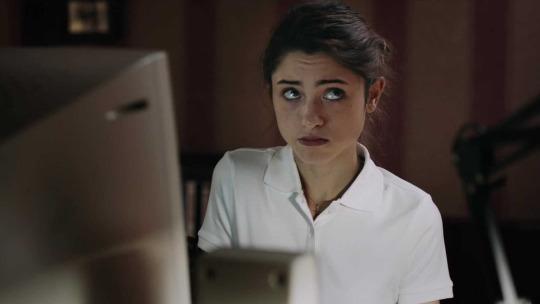
66. Yes, God, Yes (Karen Maine)- Most people who are Catholic, including me, are conflicted about it. Most people who make movies about being Catholic hate it and have an axe to grind. This film is capable of such knowing wit and nuance when it comes to the lived-in details of attending a high school retreat, but it's more concerned with taking aim at hypocrisy in the broad way that we've seen a million times. By the end, the film is surprisingly all-or-nothing when Christian teenagers actually contain multitudes.
Part of the problem is that Karen Maine's screenplay doesn't know how naive to make the Alice character. Sometimes she's reasonably naive for a high school senior in 2001; sometimes she's comically naive so that the plot can work; and sometimes she's stupid, which isn't the same as naive.
65. Bad Boys for Life (Adil El Arbi and Bilall Fallah)- This might be the first buddy cop movie in which the vets make peace with the tech-comm youngs who use new techniques. If that's the only novelty on display here--and it is--then maybe that's enough. I laughed maybe once. Not that the mistaken identity subplot of Bad Boys 1 is genius or anything, but this entry felt like it needed just one more layer to keep it from feeling as basic as it does. Speaking of layers though, it's almost impossible to watch any Will Smith movie now without viewing it through the meta-narrative of "What is Will Smith actually saying about his own status at this point in his career?" He's serving it up to us.
I derived an inordinate amount of pleasure from seeing the old school Simpson/Bruckheimer logo.
64. The Gentlemen (Guy Ritchie)- Look, I'm not going to be too negative on a movie whose crime slang is so byzantine that it has to be explained with subtitles. That's just me. I'm a simple man. But I can tell you that I tuned out pretty hard after seven or eight double-crosses.
The bloom is off the rose a bit for Ritchie, but he can still nail a music cue. I've been waiting for someone to hit "That's Entertainment" the way he does on the end credits.
63. Bad Hair (Justin Simien)- In Bad Hair, an African-American woman is told by her boss at a music video channel in 1989 that straightening her hair is the way to get ahead; however, her weave ends up having a murderous mind of its own. Compared to that charged, witty logline, the execution of the plot itself feels like a laborious, foregone conclusion. I'm glad that Simien, a genuinely talented writer, is making movies again though. Drop the skin-care routine, Van Der Beek!
62. Greyhound (Aaron Schneider)- "If this is the type of role that Tom Hanks writes for himself, then he understands his status as America's dad--'wise as the serpent, harmless as the dove'--even better than I thought." "America's Dad! Aye aye, sir!" "At least half of the dialogue is there for texture and authenticity, not there to be understood by the audience." "Fifty percent, Captain!" "The environment looks as fake as possible, but I eventually came around to the idea that the movie is completely devoid of subtext." "No subtext to be found, sir!"
61. Mank (David Fincher)- About ten years ago, the Creative Screenwriting podcast spent an hour or so with James Vanderbilt, the writer of Zodiac and nothing else that comes close, as he relayed the creative paces that David Fincher pushed him through. Hundreds of drafts and years of collaborative work eventuated in the blueprint for Fincher's most exacting, personal film, which he didn't get a writing credit on only because he didn't seek one.
Something tells me that Fincher didn't ask for rewrites from his dead father. No matter what visuals and performances the director can coax from the script--and, to be clear, these are the worst visuals and performances of his career--they are limited by the muddy lightweight pages. There are plenty of pleasures, like the slippery election night montage or the shakily platonic relationship between Mank and Marion. But Fincher hadn't made a film in six years, and he came back serving someone else's master.
60. Tesla (Michael Almereyda)- "You live inside your head." "Doesn't everybody?"
As usual, Almereyda's deconstructions are invigorating. (No other moment can match the first time Eve Hewson's Anne fact-checks something with her anachronistic laptop.) But they don't add up to anything satisfying because Tesla himself is such an opaque figure. Driven by the whims of his curiosity without a clear finish line, the character gives Hawke something enigmatic to play as he reaches deep into a baritone. But he's too inward to lend himself to drama. Tesla feels of a piece with Almereyda's The Experimenter, and that's the one I would recommend.
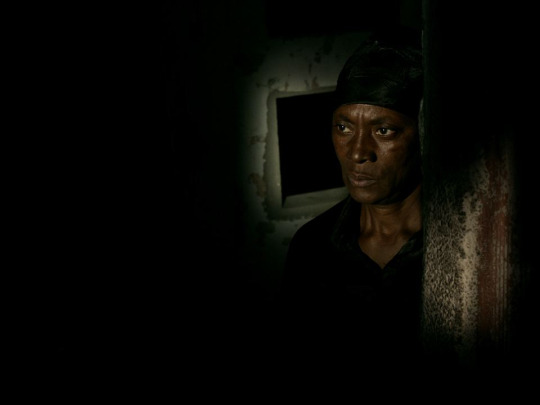
59. Vitalina Varela (Pedro Costa)- I can't oversell how delicately beautiful this film is visually. There's a scene in which Vitalina lugs a lantern into a church, but we get several seconds of total darkness before that one light source carves through it and takes over part of the frame. Each composition is as intricate as it is overpowering, achieving a balance between stark and mannered.
That being said, most of the film is people entering or exiting doors. I felt very little of the haunting loss that I think I was supposed to.
58. The Rhythm Section (Reed Morano)- Call it the Timothy Hutton in The General's Daughter Corollary: If a name-actor isn't in the movie much but gets third billing, then, despite whom he sends the protagonist to kill, he is the Actual Bad Guy.
Even if the movie serves up a lot of cliche, the action and sound design are visceral. I would like to see more from Morano.
57. Red, White and Blue (Steve McQueen)- Well-made and heartfelt even if it goes step-for-step where you think it will.
Here's what I want to know though: In the academy training sequence, the police cadets have to subdue a "berserker"; that is, a wildman who swings at their riot gear with a sledgehammer. Then they get him under control, and he shakes their hands, like, "Good angle you took on me there, mate." Who is that guy and where is his movie? Is this full-time work? Is he a police officer or an independent contractor? What would happen if this exercise didn't go exactly as planned?
56. Wolfwalkers (Tomm Moore and Ross Stewart)- The visuals have an unfinished quality that reminded me of The Tale of Princess Kaguya--the center of a flame is undrawn white, and fog is just negative space. There's an underlying symmetry to the film, and its color palette changes with mood.
Narratively, it's pro forma and drawn-out. Was Riley in Inside Out the last animated protagonist to get two parents? My daughter stuck with it, but she needed a lot of context for the religious atmosphere of 17th century Ireland.
55. What She Said: The Art of Pauline Kael (Rob Garver)- The film does little more than one might expect; it's limited in the way that any visual medium is when trying to sum up a woman of letters. But as far as education for Kael's partnership with Warren Beatty or the idea of The New Yorker paying her for only six months out of the year, it was useful for me.
Although Garver isn't afraid to point to the work that made Kael divisive, it would have been nice to have one or two interview subjects who questioned her greatness, rather than the crew of Paulettes who, even when they do say something like, "Sometimes I radically disagreed with her," do it without being able to point to any specifics.
54. Beastie Boys Story (Spike Jonze)- As far as this Spike Jonze completist is concerned, this is more of a Powerpoint presentation than a movie, Beastie Boys Story still warmed my heart, making me want to fire up Paul's Boutique again and take more pictures of my buddies.
53. Tenet (Christopher Nolan)- Cool and cold, tantalizing and frustrating, loud and indistinct, Tenet comes close to Nolan self-parody, right down to the brutalist architecture and multiple characters styled like him. The setpieces grabbed me, I'll admit.
Nolan's previous film, which is maybe his best, was "about" a lot and just happened to play with time; Tenet is only about playing with time.
PRETTY GOOD MOVIES
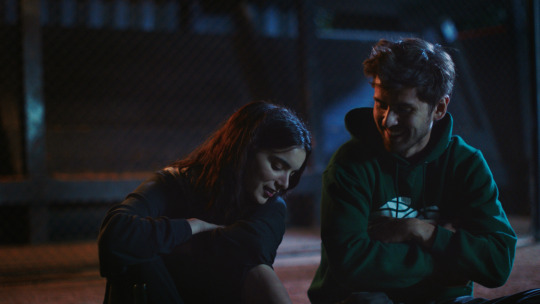
52. Shithouse (Cooper Raiff)- "Death is ass."
There's such a thing as too naturalistic. If I wanted to hear how college freshmen really talked, I would hang out with college freshmen. But you have to take the good verisimilitude with the bad, and good verisimilitude is the mother's Pod Save America t-shirt.
There are some poignant moments (and a gonzo performance from Logan Miller) in this auspicious debut from Cooper Raiff, the writer/director/editor/star. But the second party sequence kills some of the momentum, and at a crucial point, the characters spell out some motivation that should have stayed implied.
51. Totally Under Control (Alex Gibney, Ophelia Harutyunyan, Suzanne Hillinger)- As dense and informative as any other Gibney documentary with the added flex of making it during the pandemic it is investigating.
But yeah, why am I watching this right now? I don't need more reasons to be angry with Trump, whom this film calmly eviscerates. The directors analyze Trump's narcissism first through his contradictions of medical expertise in order to protect the economy that could win him re-election. Then it takes aim at his hiring based on loyalty instead of experience. But you already knew that, which is the problem with the film, at least for now.
50. Happiest Season (Clea Duvall)- I was in the perfect mood to watch something this frothy and bouncy. Every secondary character receives a moment in the sun, and Daniel Levy gets a speech that kind of saves the film at a tipping point.
I must say though: I wanted to punch Harper in her stupid face. She is a terrible romantic partner, abandoning or betraying Abby throughout the film and dissembling her entire identity to everyone else in a way that seems absurd for a grown woman in 2020. Run away, Kristen. Perhaps with Aubrey Plaza, whom you have more chemistry with. But there I go shipping and aligning myself with characters, which only proves that this is an effective romantic comedy.
49. The Way Back (Gavin O’Connor)- Patient but misshapen, The Way Back does just enough to overcome the cliches that are sort of unavoidable considering the genre. (I can't get enough of the parent character who, for no good reason, doesn't take his son's success seriously. "Scholarship? What he's gotta do is put his nose in them books! That's why I don't go to his games. [continues moving boxes while not looking at the other character] Now if you'll excuse me while I wait four scenes before showing up at a game to prove that I'm proud of him after all...")
What the movie gets really right or really wrong in the details about coaching and addiction is a total crap-shoot. But maybe I've said too much already.
48. The Whistlers (Corneliu Porumboiu)- Porumboiu is a real artist who seems to be interpreting how much surveillance we're willing to acknowledge and accept, but I won't pretend to have understood much of the plot, the chapters or which are told out of order. Sometimes the structure works--the beguiling, contextless "high-class hooker" sequence--but I often wondered if the film was impenetrable in the way that Porumboiu wanted it to be or impenetrable in the way he didn't.
To tell you the truth, the experience kind of depressed me because I know that, in my younger days, this film is the type of thing that I would re-watch, possibly with the chronology righted, knowing that it is worth understanding fully. But I have two small children, and I'm exhausted all the time, and I kind of thought I should get some credit for still trying to catch up with Romanian crime movies in the first place.
47. Borat Subsequent Moviefilm (Jason Woliner)- I laughed too much to get overly critical, but the film is so episodic and contrived that it's kind of exhausting by the end--even though it's achieving most of its goals. Maybe Borat hasn't changed, but the way our citizens own their ugliness has.
46. First Cow (Kelly Reichardt)- Despite how little happens in the first forty minutes, First Cow is a thoughtful capitalism parable. Even though it takes about forty minutes to get going, the friendship between Cookie and King-Lu is natural and incisive. Like Reichardt's other work, the film's modest premise unfolds quite gracefully, except for in the first forty minutes, which are uneventful.
45. Les Miserables (Ladj Ly)- I loved parts of the film--the disorienting, claustrophobic opening or the quick look at the police officers' home lives, for example. But I'm not sure that it does anything very well. The needle the film tries to thread between realism and theater didn't gel for me. The ending, which is ambiguous in all of the wrong ways, chooses the theatrical. (If I'm being honest, my expectations were built up by Les Miserables' Jury Prize at Cannes, and it's a bit superficial to be in that company.)
If nothing else, it's always helpful to see how another country's worst case scenario in law enforcement would look pretty good over here.
44. Bad Education (Cory Finley)- The film feels too locked-down and small at the beginning, so intent on developing the protagonist neutrally that even the audience isn't aware of his secrets. So when he faces consequences for those secrets, there's a disconnect. Part of tragedy is seeing the doom coming, right?
When it opens up, however, it's empathetic and subtle, full of a dry irony that Finley is already specializing in after only one other feature. Geraldine Viswanathan and Allison Janney get across a lot of interiority that is not on the page.
43. The Trip to Greece (Michael Winterbottom)- By the fourth installment, you know whether you're on board with the franchise. If you're asking "Is this all there is?" to Coogan and Brydon's bickering and impressions as they're served exotic food in picturesque settings, then this one won't sway you. If you're asking "Is this all there is?" about life, like they are, then I don't need to convince you.
I will say that The Trip to Spain seemed like an enervated inflection point, at which the squad could have packed it in. The Trip to Greece proves that they probably need to keep doing this until one of them dies, which has been the subtext all along.
42. Feels Good Man (Arthur Jones)- This documentary centers on innocent artist Matt Furie's helplessness as his Pepe the Frog character gets hijacked by the alt-right. It gets the hard things right. It's able to, quite comprehensively, trace a connection from 4Chan's use of Pepe the Frog to Donald Trump's near-assuming of Pepe's ironic deniability. Director Arthur Jones seems to understand the machinations of the alt-right, and he articulates them chillingly.
The easy thing, making us connect to Furie, is less successful. The film spends way too much time setting up his story, and it makes him look naive as it pits him against Alex Jones in the final third. Still, the film is a quick ninety-two minutes, and the highs are pretty high.
41. The Old Guard (Gina Prince-Bythewood)- Some of the world-building and backstory are handled quite elegantly. The relationships actually do feel centuries old through specific details, and the immortal conceit comes together for an innovative final action sequence.
Visually and musically though, the film feels flat in a way that Prince-Bythewood's other films do not. I blame Netflix specs. KiKi Layne, who tanked If Beale Street Could Talk for me, nearly ruins this too with the child-actory way that she stresses one word per line. Especially in relief with one of our more effortless actresses, Layne is distracting.
40. The Trial of the Chicago 7 (Aaron Sorkin)- Whenever Sacha Baron Cohen's Abbie Hoffman opens his mouth, the other defendants brace themselves for his dismissive vulgarity. Even when it's going to hurt him, he can't help but shoot off at the mouth. Of course, he reveals his passionate and intelligent depths as the trial goes on. The character is the one that Sorkin's screenplay seems the most endeared to: In the same way that Hoffman can't help but be Hoffman, Sorkin can't help but be Sorkin. Maybe we don't need a speech there; maybe we don't have to stretch past two hours; maybe a bon mot diffuses the tension. But we know exactly what to expect by now. The film is relevant, astute, witty, benevolent, and, of course, in love with itself. There are a handful of scenes here that are perfect, so I feel bad for qualifying so much.
A smaller point: Daniel Pemberton has done great work in the past (Motherless Brooklyn, King Arthur, The Man from U.N.C.L.E.), but the first sequence is especially marred by his sterile soft-rock approach.
GOOD MOVIES

39. Time (Garrett Bradley)- The key to Time is that it provides very little context. Why the patriarch of this family is serving sixty years in prison is sort of besides the point philosophically. His wife and sons have to move on without him, and the tragedy baked into that fact eclipses any notion of what he "deserved." Feeling the weight of time as we switch back and forth between a kid talking about his first day of kindergarten and that same kid graduating from dentistry school is all the context we need. Time's presentation can be quite sumptuous: The drone shot of Angola makes its buildings look like crosses. Or is it X's?
At the same time, I need some context. When director Garrett Bradley withholds the reason Robert's in prison, and when she really withholds that Fox took a plea and served twelve years, you start to see the strings a bit. You could argue that knowing so little about why, all of a sudden, Robert can be on parole puts you into the same confused shoes as the family, but it feels manipulative to me. The film is preaching to the choir as far as criminal justice goes, which is fine, but I want it to have the confidence to tell its story above board.
38. Bloody Nose, Empty Pockets (Turner Ross and Bill Ross IV)- I have a barfly friend whom I see maybe once a year. When we first set up a time to meet, I kind of dread it and wonder what we'll have to talk about. Once we do get together, we trip on each other's words a bit, fumbling around with the rhythm of conversation that we mastered decades ago. He makes some kind of joke that could have been appropriate then but isn't now.
By the end of the day, hours later, we're hugging and maybe crying as we promise each other that we won't wait as long next time.
That's the exact same journey that I went on with this film.
37. Underwater (William Eubank)- Underwater is a story that you've seen before, but it's told with great confidence and economy. I looked up at twelve minutes and couldn't believe the whole table had been set. Kristen plays Ripley and projects a smart, benevolent poise.
36. The Lodge (Veronika Franz and Severin Fiala)- I prefer the grounded, manicured first half to the more fantastic second half. The craziness of the latter is only possible through the hard work of the former though. As with Fiala and Franz's previous feature, the visual rhymes and motifs get incorporated into the soup so carefully that you don't realize it until they overwhelm you in their bleak glory.
Small note: Alicia Silverstone, the male lead's first wife, and Riley Keough, his new partner, look sort of similar. I always think that's a nice note: "I could see how he would go for her."
35. Miss Americana (Lana Wilson)- I liked it when I saw it as a portrait of a person whose life is largely decided for her but is trying to carve out personal spaces within that hamster wheel. I loved it when I realized that describes most successful people in their twenties.
34. Sound of Metal (Darius Marder)- Riz Ahmed is showing up on all of the best performances of the year lists, but Sound of Metal isn't in anyone's top ten films of the year. That's about right. Ahmed's is a quiet, stubborn performance that I wish was in service of more than the straight line that we've seen before.
In two big scenes, there's this trick that Ahmed does, a piecing together of consequences with his eyes, as if he's moving through a flow chart in real time. In both cases, the character seems locked out and a little slower than he should be, which is, of course, why he's facing the consequences in the first place. To be charitable to a film that was a bit of a grind, it did make me notice a thing a guy did with his eyes.
33. Pieces of a Woman (Kornel Mundruczo)- Usually when I leave acting showcases like this, I imagine the film without the Oscar-baiting speeches, but this is a movie that specializes in speeches. Pieces of a Woman is being judged, deservedly so, by the harrowing twenty-minute take that opens the film, which is as indulgent as it is necessary. But if the unbroken take provides the "what," then the speeches provide the "why."
This is a film about reclaiming one's body when it rebels against you and when other people seek ownership of it. Without the Ellen Burstyn "lift your head" speech or the Vanessa Kirby show-stopper in the courtroom, I'm not sure any of that comes across.
I do think the film lets us off the hook a bit with the LaBoeuf character, in the sense that it gives us reasons to dislike him when it would be more compelling if he had done nothing wrong. Does his half-remembering of the White Stripes count as a speech?
32. Ma Rainey’s Black Bottom (George C. Wolfe)- This is such a play, not only in the locked-down location but also through nearly every storytelling convention: "Where are the two most interesting characters? Oh, running late? They'll enter separately in animated fashion?" But, to use the type of phrase that the characters might, "Don't hate the player; hate the game."
Perhaps the most theatrical note in this treatise on the commodification of expression is the way that, two or three times, the proceedings stop in their tracks for the piece to declare loudly what it's about. In one of those clear-outs, Boseman, who looks distractingly sick, delivers an unforgettable monologue that transports the audience into his character's fragile, haunted mind. He and Viola Davis are so good that the film sort of buckles under their weight, unsure of how to transition out of those spotlight moments and pretend that the story can start back up. Whatever they're doing is more interesting than what's being achieved overall.
31. Another Round (Thomas Vinterberg)- It's definitely the film that Vinterberg wanted to make, but despite what I think is a quietly shattering performance from Mikkelsen, Another Round moves in a bit too much of a straight line to grab me fully. The joyous final minutes hint at where it could have gone, as do pockets of Vinterberg's filmography, which seems newly tethered to realism in a way that I don't like. The best sequences are the wildest ones, like the uproarious trip to the grocery store for fresh cod, so I don't know why so much of it takes place in tiny hallways at magic hour. I give the inevitable American remake* permission to use these notes.
*- Just spitballing here. Martin: Will Ferrell, Nikolaj (Nick): Ben Stiller, Tommy: Owen Wilson, Peter: Craig Robinson
30. The Invisible Man (Leigh Whannell)- Exactly what I wanted. Exactly what I needed.
I think a less conclusive finale would have been better, but what a model of high-concept escalation. This is the movie people convinced me Whannell's Upgrade was.
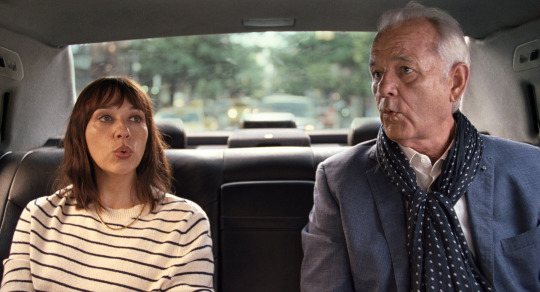
29. On the Rocks (Sofia Coppola)- Slight until the Mexican sojourn, which expands the scope and makes the film even more psychosexual than before. At times it feels as if Coppola is actively simplifying, rather than diving into the race and privilege questions that the Murray character all but demands.
As for Murray, is the film 50% worse without him? 70%? I don't know if you can run in supporting categories if you're the whole reason the film exists.
28. Mangrove (Steve McQueen)- The first part of the film seemed repetitive and broad to me. But once it settled in as a courtroom drama, the characterization became more shaded, and the filmmaking itself seemed more fluid. I ended up being quite outraged and inspired.
27. Shirley (Josephine Decker)- Josephine Decker emerges as a real stylist here, changing her foggy, impressionistic approach not one bit with a little more budget. Period piece and established actors be damned--this is still as much of a reeling fever dream as Madeline's Madeline. Both pieces are a bit too repetitive and nasty for my taste, but I respect the technique.
Here's my mandatory "Elisabeth Moss is the best" paragraph. While watching her performance as Shirley Jackson, I thought about her most famous role as Peggy on Mad Men, whose inertia and need to prove herself tied her into confidence knots. Shirley is almost the opposite: paralyzed by her worldview, certain of her talent, rejecting any empathy. If Moss can inhabit both characters so convincingly, she can do anything.
26. An American Pickle (Brandon Trost)- An American Pickle is the rare comedy that could actually use five or ten extra minutes, but it's a surprisingly heartfelt and wholesome stretch for Rogen, who is earnest in the lead roles.
25. The King of Staten Island (Judd Apatow)- At two hours and fifteen minutes, The King of Staten Island is probably the first Judd Apatow film that feels like the exact right length. For example, the baggy date scene between a gracious Bill Burr and a faux-dowdy Marisa Tomei is essential, the sort of widening of perspective that something like Trainwreck was missing.
It's Pete Davidson's movie, however, and though he has never been my cup of tea, I think he's actually quite powerful in his quiet moments. The movie probes some rare territory--a mentally ill man's suspicion that he is unlovable, a family's strategic myth-making out of respect for the dead. And when Davidson shows up at the firehouse an hour and fifteen minutes in, it feels as if we've built to a last resort.
24. Swallow (Carlo Mirabella-Davis)- The tricky part of this film is communicating Hunter's despair, letting her isolation mount, but still keeping her opaque. It takes a lot of visual discipline to do that, and Claudio Mirabella-Davis is up to the task. This ends up being a much more sympathetic, expressive movie than the plot description might suggest.
(In the tie dispute, Hunter and Richie are both wrong. That type of silk--I couldn't tell how pebbled it was, but it's probably a barathea weave-- shouldn't be ironed directly, but it doesn't have to be steamed. On a low setting, you could iron the back of the tie and be fine.)
23. The Vast of Night (Andrew Patterson)- I wanted a bit more "there" there; The film goes exactly where I thought it would, and there isn't enough humor for my taste. (The predictability might be a feature, not a bug, since the film is positioned as an episode of a well-worn Twilight Zone-esque show.)
But from a directorial standpoint, this is quite a promising debut. Patterson knows when to lock down or use silence--he even cuts to black to force us to listen more closely to a monologue. But he also knows when to fill the silence. There's a minute or so when Everett is spooling tape, and he and Fay make small talk about their hopes for the future, developing the characters' personalities in what could have been just mechanics. It's also a refreshingly earnest film. No one is winking at the '50s setting.
I'm tempted to write, "If Andrew Patterson can make this with $1 million, just imagine what he can do with $30 million." But maybe people like Shane Carruth have taught us that Patterson is better off pinching pennies in Texas and following his own muse.
22. Martin Eden (Pietro Marcello)- At first this film, adapted from a picaresque novel by Jack London, seemed as if it was hitting the marks of the genre. "He's going from job to job and meeting dudes who are shaping his worldview now." But the film, shot in lustrous Super 16, won me over as it owned the trappings of this type of story, forming a character who is a product of his environment even as he transcends it. By the end, I really felt the weight of time.
You want to talk about something that works better in novels than films though? When a passionate, independent protagonist insists that a woman is the love of his life, despite the fact that she's whatever Italians call a wet blanket. She's rich, but Martin doesn't care about her money. He hates her family and friends, and she refuses to accept him or his life pursuits. She's pretty but not even as pretty as the waitress they discuss. Tell me what I'm missing here. There's archetype, and there's incoherence.
21. Bacurau (Kleber Mendonca Filho and Juliano Dornelles)- Certain images from this adventurous film will stick with me, but I got worn out after the hard reset halfway through. As entranced as I was by the mystery of the first half, I think this blood-soaked ensemble is better at asking questions than it is at answering them.
20. Let Them All Talk (Steven Soderbergh)- The initial appeal of this movie might be "Look at these wonderful actresses in their seventies getting a movie all to themselves." And the film is an interesting portrait of ladies taking stock of relationships that have spanned decades. But Soderbergh and Eisenberg handle the twentysomething Lucas Hedges character with the same openness and empathy. His early reasoning for going on the trip is that he wants to learn from older women, and Hedges nails the puppy-dog quality of a young man who would believe that. Especially in the scenes of aspirational romance, he's sweet and earnest as he brushes his hair out of his face.
Streep plays Alice Hughes, a serious author of literary fiction, and she crosses paths with Kelvin Kranz, a grinder of airport thrillers. In all of the right ways, Let Them All Talk toes the line between those two stances as an entertaining, jaunty experiment that also shoulders subtextual weight. If nothing else, it's easy to see why a cruise ship's counterfeit opulence, its straight lines at a lean, would be visually engaging to Soderbergh. You can't have a return to form if your form is constantly evolving.

19. Dick Johnson Is Dead (Kirsten Johnson)- Understandably, I don't find the subject as interesting as his own daughter does, and large swaths of this film are unsure of what they're trying to say. But that's sort of the point, and the active wrestling that the film engages in with death ultimately pays off in a transcendent moment. The jaw-dropping ending is something that only non-fiction film can achieve, and Johnson's whole career is about the search for that sort of serendipity.
18. Da 5 Bloods (Spike Lee)- Delroy Lindo is a live-wire, but his character is the only one of the principals who is examined with the psychological depth I was hoping for. The first half, with all of its present-tense flourishes, promises more than the gunfights of the second half can deliver. When the film is cooking though, it's chock full of surprises, provocations, and pride.
17. Never Rarely Sometimes Always (Eliza Hittmann)- Very quickly, Eliza Hittmann has established herself as an astute, empathetic director with an eye for discovering new talent. I hope that she gets to make fifty more movies in which she objectively follows laconic young people. But I wanted to like this one more than I did. The approach is so neutral that it's almost flat to me, lacking the arc and catharsis of her previous film, Beach Rats. I still appreciate her restraint though.
GREAT MOVIES
16. Young Ahmed (Jean-Pierre Dardenne and Luc Dardenne)- I don't think the Dardennes have made a bad movie yet, and I'm glad they turned away from the slight genre dipping of The Unknown Girl, the closest to bad that they got. Young Ahmed is a lean, daring return to form.
Instead of following an average person, as they normally do, the Dardenne Brothers follow an extremist, and the objectivity that usually generates pathos now serves to present ambiguity. Ahmed says that he is changing, that he regrets his actions, but we never know how much of his stance is a put-on. I found myself wanting him to reform, more involved than I usually am in these slices of life. Part of it is that Idir Ben Addi looks like such a normal, young kid, and the Ahmed character has most of the qualities that we say we want in young people: principles, commitment, self-worth, reflection. So it's that much more destructive when those qualities are used against him and against his fellow man.
15. World of Tomorrow Episode Three: The Absent Destinations of David Prime (Don Hertzfeldt)- My dad, a man whom I love but will never understand, has dismissed modern music before by claiming that there are only so many combinations of chords. To him, it's almost impossible to do something new. Of course, this is the type of thing that an uncreative person would say--a person not only incapable of hearing the chords that combine notes but also unwilling to hear the space between the notes. (And obviously, that's the take of a person who doesn't understand that, originality be damned, some people just have to create.)
Anyway, that attitude creeps into my own thinking more than I would like, but then I watch something as wholly original as World of Tomorrow Episode Three. The series has always been a way to pile sci-fi ideas on top of each other to prove the essential truths of being and loving. And this one, even though it achieves less of a sense of yearning than its predecessor, offers even more devices to chew on. Take, for example, the idea that Emily sends her message from the future, so David's primitive technology can barely handle it. In order to move forward with its sophistication, he has to delete any extraneous skills for the sake of computer memory. So out of trust for this person who loves him, he has to weigh whether his own breathing or walking can be uninstalled as a sacrifice for her. I thought that we might have been done describing love, but there it is, a new metaphor. Mixing futurism with stick figures to get at the most pure drive possible gave us something new. It's called art, Dad.
14. On the Record (Kirby Dick and Amy Ziering)- We don't call subjects of documentaries "stars" for obvious reasons, but Drew Dixon kind of is one. Her honesty and wisdom tell a complete story of the #MeToo movement. Kirby Dick and Amy Ziering take their time developing her background at first, not because we need to "gain sympathy" or "establish credibility" for a victim of sexual abuse, but because showing her talent and enthusiasm for hip-hop A&R makes it that much more tragic when her passion is extinguished. Hell, I just like the woman, so spending a half-hour on her rise was pleasurable in and of itself.
This is a gut-wrenching, fearless entry in what is becoming Dick and Ziering's raison d'etre, but its greatest quality is Dixon's composed reflection. She helped to establish a pattern of Russell Simmons's behavior, but she explains what happened to her in ways I had never heard before.
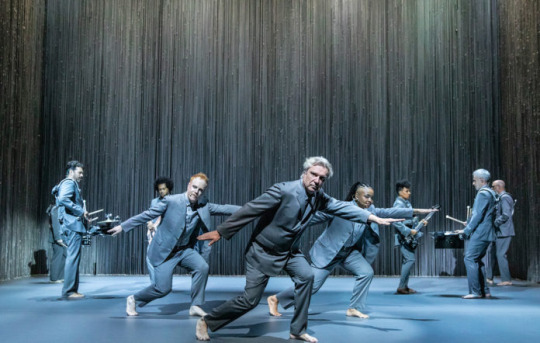
13. David Byrne’s American Utopia (Spike Lee)- I'm often impressed by the achievements that puzzle me: How did they pull that off? But I know exactly how David Byrne pulled off the impish but direct precision of American Utopia: a lot of hard work.
I can't blame Spike Lee for stealing a page from Demme's Stop Making Sense: He denies us a close-up of any audience members until two-thirds of the way through, when we get someone in absolute rapture.
12. One Night in Miami... (Regina King)- We've all cringed when a person of color is put into the position of speaking on behalf of his or her entire race. But the characters in One Night in Miami... live in that condition all the time and are constantly negotiating it. As Black public figures in 1964, they know that the consequences of their actions are different, bigger, than everyone else's. The charged conversations between Malcolm X and Sam Cooke are not about whether they can live normal lives. They're way past that. The stakes are closer to Sam Cooke arguing that his life's purpose aligns with the protection and elevation of African-Americans while Malcolm X argues that those pursuits should be the same thing. Late in the movie, Cassius Clay leaves the other men, a private conversation, to talk to reporters, a public conversation. But the film argues that everything these men do is always already public. They're the most powerful African-Americans in the country, but their lives are not their own. Or not only their own.
It's true that the first act has the clunkiness and artifice of a TV movie, but once the film settles into the motel room location and lets the characters feed off one another, it's gripping. It's kind of unfair for a movie to get this many scenes of Leslie Odom Jr. singing, but I'll take it.
11. Saint Frances (Alex Thompson)- Rilke wrote, "Perhaps everything terrible is in its deepest being something helpless that wants help from us." The characters' behavior in Saint Frances--all of these fully formed characters' behavior--made me think of that quotation. When they lash out at one another, even at their nastiest, the viewer has a window into how they're expressing pain they can't verbalize. The film is uneven in its subtlety, but it's a real showcase for screenwriter and star Kelly O'Sullivan, who is unflinching and dynamic in one of the best performances of the year. Somebody give her some of the attention we gave to Zach Braff for God's sake.
10. Boys State (Jesse Moss and Amanda McBaine)- This documentary is kind of a miracle from a logistical standpoint. From casting interviews beforehand, lots of editing afterwards, or sly note-taking once the conference began, McBaine and Moss happened to select the four principals who mattered the most at the convention, then found them in rooms full of dudes wearing the same tucked-in t-shirt. By the way, all of the action took place over the course of one week, and by definition, the important events are carved in half.
To call Boys State a microcosm of American politics is incorrect. These guys are forming platforms and voting in elections. What they're doing is American politics, so when they make the same compromises and mistakes that active politicians do, it produces dread and disappointment. So many of the boys are mimicking the political theater that they see on TV, and that sweaty sort of performance is going to make a Billy Mitchell out of this kid Ben Feinstein, and we'll be forced to reckon with how much we allow him to evolve as a person. This film is so precise, but what it proves is undeniably messy. Luckily, some of these seventeen-year-olds usher in hope for us all.
If nothing else, the film reveals the level to which we're all speaking in code.
9. The Nest (Sean Durkin)- In the first ten minutes or so of The Nest, the only real happy minutes, father and son are playing soccer in their quaint backyard, and the father cheats to score on a children's net before sliding on the grass to rub in his victory. An hour later, the son kicks the ball around by himself near a regulation goal on the family's massive property. The contrast is stark and obvious, as is the symbolism of the dead horse, but that doesn't mean it's not visually powerful or resonant.
Like Sean Durkin's earlier film, Martha Marcy May Marlene, the whole of The Nest is told with detail of novelistic scope and an elevation of the moment. A snippet of radio that mentions Ronald Reagan sets the time period, rather than a dateline. One kid saying "Thanks, Dad" and another kid saying, "Thanks, Rory" establishes a stepchild more elegantly than any other exposition might.
But this is also a movie that does not hide what it means. Characters usually say exactly what is on their minds, and motivations are always clear. For example, Allison smokes like a chimney, so her daughter's way of acting out is leaving butts on the window sill for her mother to find. (And mother and daughter both definitely "act out" their feelings.) On the other hand, Ben, Rory's biological son, is the character least like him, so these relationships aren't too directly parallel. Regardless, Durkin uses these trajectories to cast a pall of familial doom.
8. Sorry We Missed You (Sean Durkin)- Another precisely calibrated empathy machine from Ken Loach. The overwhelmed matriarch, Abby, is a caretaker, and she has to break up a Saturday dinner to rescue one of her clients, who wet herself because no one came to help her to the bathroom. The lady is embarrassed, and Abby calms her down by saying, "You mean more to me than you know." We know enough about Abby's circumstances to realize that it's sort of a lie, but it's a beautiful lie, told by a person who cares deeply but is not cared for.
Loach's central point is that the health of a family, something we think of as immutable and timeless, is directly dependent upon the modern industry that we use to destroy ourselves. He doesn't have to be "proven" relevant, and he didn't plan for Covid-19 to point to the fragility of the gig economy, but when you're right, you're right.
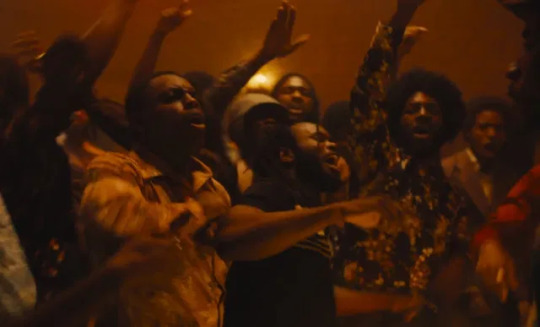
7. Lovers Rock (Steve McQueen)- swear to you I thought: "This is an impeccable depiction of a great house party. The only thing it's missing is the volatile dude who scares away all the girls." And then the volatile dude who scares away all the girls shows up.
In a year short on magic, there are two or three transcendent moments, but none of them can equal the whole crowd singing along to "Silly Games" way after the song has ended. Nothing else crystallizes the film's note of celebration: of music, of community, of safe spaces, of Black skin. I remember moments like that at house parties, and like all celebrations, they eventually make me sad.
6. Crip Camp: A Disability Revolution (Nicole Newnham and James Lebrecht)- I held off on this movie because I thought that I knew what it was. The setup was what I expected: A summer camp for the disabled in the late '60s takes on the spirit of the time and becomes a haven for people who have not felt agency, self-worth, or community anywhere else. But that's the right-place-right-time start of a story that takes these figures into the '80s as they fight for their rights.
If you're anything like my dumb ass, you know about 504 accommodations from the line on a college syllabus that promises equal treatment. If 2020 has taught us anything though, it's that rights are seized, not given, and this is the inspiring story of people who unified to demand what they deserved. Judy Heumann is a civil rights giant, but I'm ashamed to say I didn't know who she was before this film. If it were just a history lesson that wasn't taught in school, Crip Camp would still be valuable, but it's way more than that.
5. Palm Springs (Max Barbakow)- When explaining what is happening to them, Andy Samberg's Nyles twirls his hand at Cristin Milioti's Sara and says, "It's one of those infinite time-loop scenarios." Yeah, one of those. Armed with only a handful of fictional examples, she and the audience know exactly what he means, and the continually inventive screenplay by Andy Siara doesn't have to do any more explaining. In record time, the film accelerates into its premise, involves her, and sets up the conflict while avoiding the claustrophobia of even Groundhog Day. That economy is the strength that allows it to be as funny as it is. By being thrifty with the setup, the savings can go to, say, the couple crashing a plane into a fiery heap with no consequences.
In some accidental ways, this is, of course, a quarantine romance as well. Nyles and Sara frustratingly navigate the tedious wedding as if they are play-acting--which they sort of are--then they push through that sameness to grow for each other, realizing that dependency is not weakness. The best relationships are doing the same thing right now.
Although pointedly superficial--part of the point of why the couple is such a match--and secular--I think the notion of an afterlife would come up at least once--Palm Springs earns the sincerity that it gets around to. And for a movie ironic enough to have a character beg to be impaled so that he doesn't have to sit in traffic, that's no small feat.
4. The Assistant (Kitty Green)- A wonder of Bressonian objectivity and rich observation, The Assistant is the rare film that deals exclusively with emotional depth while not once explaining any emotions. One at a time, the scrape of the Kleenex box might not be so grating, the long hallway trek to the delivery guy might not be so tiring, but this movie gets at the details of how a job can destroy you in ways that add up until you can't even explain them.
3. Promising Young Woman (Emerald Fennell)- In her most incendiary and modern role, Carey Mulligan plays Cassie, which is short for Cassandra, that figure doomed to tell truths that no one else believes. The web-belted boogeyman who ruined her life is Al, short for Alexander, another Greek who is known for his conquests. The revenge story being told here--funny in its darkest moments, dark in its funniest moments--is tight on its surface levels, but it feels as if it's telling a story more archetypal and expansive than that too.
An exciting feature debut for its writer-director Emerald Fennell, the film goes wherever it dares. Its hero has a clear purpose, and it's not surprising that the script is willing to extinguish her anger halfway through. What is surprising is the way it renews and muddies her purpose as she comes into contact with half-a-dozen brilliant one- or two-scene performances. (Do you think Alfred Molina can pull off a lawyer who hates himself so much that he can't sleep? You would be right.)
Promising Young Woman delivers as an interrogation of double standards and rape culture, but in quiet ways it's also about our outsized trust in professionals and the notion that some trauma cannot be overcome.
INSTANT CLASSICS

2. Soul (Pete Docter)- When Pete Docter's Up came out, it represented a sort of coronation for Pixar: This was the one that adults could like unabashedly. The one with wordless sequences and dead children and Ed Asner in the lead. But watching it again this week with my daughter, I was surprised by how high-concept and cloying it could be. We choose not to remember the middle part with the goofy dog stuff.
Soul is what Up was supposed to be: honest, mature, stirring. And I don't mean to imply that a family film shouldn't make any concessions to children. But Soul, down to the title, never compromises its own ambition. Besides Coco, it's probably the most credible character study that Pixar has ever made, with all of Joe's growth earned the hard way. Besides Inside Out, it's probably the wittiest comedy that Pixar has ever made, bursting with unforced energy.
There's a twitter fascination going around about Dez, the pigeon-figured barber character whose scene has people gushing, "Crush my windpipe, king" or whatever. Maybe that's what twitter does now, but no one fantasized about any characters in Up. And I count that as progress.
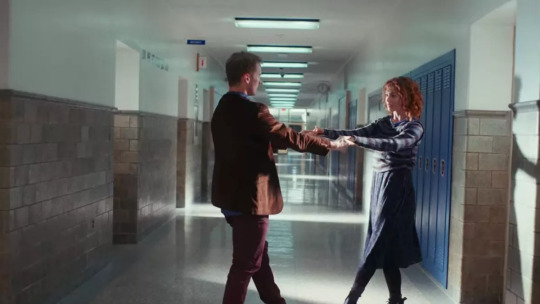
1. I’m Thinking of Ending Things (Charlie Kaufman)- After hearing that our name-shifting protagonist moonlights as an artist, a no-nonsense David Thewlis offers, "I hope you're not an abstract artist." He prefers "paintings that look like photographs" over non-representational mumbo-jumbo. And as Jessie Buckley squirms to try to think of a polite way to talk back, you can tell that Charlie Kaufman has been in the crosshairs of this same conversation. This morose, scary, inscrutable, expressionist rumination is not what the Netflix description says it is at all, and it's going to bother nice people looking for a fun night in. Thank God.
The story goes that Steven Spielberg and George Lucas, when constructing Raiders of the Lost Ark, sought to craft a movie that was "only the good parts" with little of the clunky setup that distracted from action. What we have here is a Charlie Kaufman movie with only the Charlie Kaufman moments, less interested than ever before at holding one's hand. The biting humor is here, sometimes aimed at philistines like the David Thewlis character above, sometimes at the niceties that we insist upon. The lonely horror of everyday life is here, in the form of missed calls from oneself or the interruption of an inner monologue. Of course, communicating the overwhelming crush of time, both unknowable and familiar, is the raison d'etre.
A new pet motif seems to be the way that we don't even own our own knowledge. The Young Woman recites "Bonedog" by Eva H.D., which she claims/thinks she wrote, only to find Jake's book open to that page, next to a Pauline Kael book that contains a Woman Under the Influence review that she seems to have internalized later. When Jake muses about Wordsworth's "Lucy Poems," it starts as a way to pass the time, then it becomes a way to lord his education over her, then it becomes a compliment because the subject resembles her, then it becomes a way to let her know that, in the grand scheme of things, she isn't that special at all. This film jerks the viewer through a similar wintry cycle and leaves him with his own thoughts. It's not a pretty picture, but it doesn't look like anything else.
8 notes
·
View notes
Text
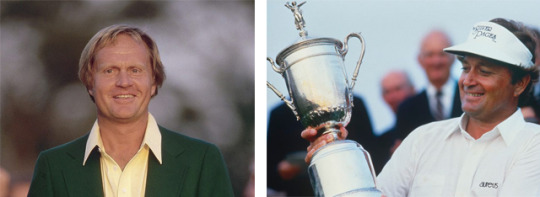
1986-The Old Guys Win
By ED TRAVIS
Phil Mickelson's 2021 PGA Championship win 23 days shy of his 51st birthday made Lefty the oldest player to ever win a major championship and it brings to mind when two "old guys" beat younger fields in the majors. In 1986 at 46 Jack Nicklaus won the Masters for his 18th major and another "seasoned citizen," 43-year-old Raymond Floyd triumphed in the US Open.
It was a long time ago and a couple of reminders of how it was are in order.
President Ronald Reagan led the nation in mourning for the astronauts who perished when the Space Shuttle Challenger disintegrated shortly after liftoff and Mikhail Gorbachev was General Secretary of the USSR as his country struggled to contain the Chernobyl nuclear reactor explosion.
Many of us viewed Halley's Comet as it looped around the sun, watched the number one box office movie Top Gun and listened to Dionne Warwick and Lionel Richie. A gallon of gas was $0.86, the Dow Jones Industrial Index closed the year at 1,895.95 and a new Toyota Camry was $11,000.
In golf, technology had remained static for decades: wound balata-covered golf balls, persimmon headed woods and, except for Ping Eye 2s, thin-bladed hard-to-hit irons. However, in 1986 the end of an era was approaching. True, we had to wait another 14 years until Titleist introduced the game-changing Pro V1 and Ely Callaway was five years away from producing the Big Bertha driver that soon relegated persimmon drivers to the garage. Graphite shafts had been invented in 1969 by Frank Thomas at Shakespeare Sporting Goods Co. (later Senior Technical Director of the USGA), but in 1986 widespread use was a decade in the future.
This level of technology was reflected in the PGA Tour's 1986 driving distance stats with the average being 261.1 yards compared to the present 296.0. The big hitter was Davis Love III averaging 285.7 yards versus Bryson DeChambeau today at 323.5 yards.
Entering the 1986 Masters Jack Nicklaus had not won a major since the 1980 PGA Championship and had been without a regular Tour win since 1984. The story of his Masters come from behind victory is well known making up four shots on Saturday's leader Greg Norman scoring 30 on Sunday's inward nine with an eagle, birdie, birdie finish.
Perhaps not as well remembered was the putter Nicklaus used for his historic 18th major the Response ZT. Designed by MacGregor Golf's Clay Long it was very lightweight having an immense aluminum head which helped Nicklaus on Augusta National's speedy greens. MacGregor had planned a modest run of a few thousand ZTs but wound up selling over 300,000 as it seemed like everyone had to have one.
The 1986 Masters was the Golden Bear's final win on the PGA Tour.
The US Open at Shinnecock Hills saw another come-from-behind victory for an over-40 player. Raymond Floyd made up a three-shot deficit on the third-round leader Greg Norman posting a spectacular 66 on Sunday to win by two strokes over Lanny Wadkins and Chip Beck. Norman after a final round of 75 was six behind Floyd.
The Aussie did have three wins in 1986 including the British Open and Norman also led after three rounds of the 1986 PGA Championship but a fourth round 76 allowed a hard charging Bob Tway to win. Though he missed out in three majors Norman did take the PGA Tour money title with $653, 296 and finished the year the number one ranked player in the world.
5 notes
·
View notes
Text
Textbooks PDF (email [email protected])
1. International Marketing by Philip Cateora, John Graham, Mary Gilly, Bruce Money, 7th Edition
2. Trillion Dollar Coach: The Leadership Playbook of Silicon Valley's Bill Campbell by Eric Schmidt, Jonathan Rosenberg, Alan Eagle
3. Ethical Dilemmas and Decisions in Criminal Justice by Joycelyn M. Pollock, 7th Edition
4. Marketing: The Core by Roger A. Kerin and Steven W. Hartley, 7th Edition
5. Organizational Behavior: A Practical, Problem-Solving Approach by Angelo Kinicki and Mel Fugate, 2nd Edition
6. Corrections Today by Larry Siegel and Clemens Bartollas
7. Corrections Today by Larry Siegel and Clemens Bartollas, Study Guide, 2nd Edition
8. Juvenile Justice by Karen M. Hess, 5th Edition
9. The Age of Unreason (1989), by Charles Handy
10. Built to Last: Successful Habits of Visionary Companies (1994), by Jim Collins and Jerry Porras
11. Competing for the Future (1996), by Gary Hamel and C.K. Prahalad
12. Competitive Strategy: Techniques for Analyzing Industries and Competitors (1980), by Michael E. Porter
13. Emotional Intelligence (1995), by Daniel Goleman
14. The E-Myth Revisited: Why Most Small Business Don't Work and What to Do about It (1985), by Michael E. Gerber
15. The Essential Drucker (2001), by Peter Drucker
16. The Fifth Discipline: The Art and Practice of the Learning Organization (1990), by Peter Senge
17. First, Break All the Rules (1999), by Marcus Buckingham and Curt Coffman
18. The Goal (1984), by Eliyahu Goldratt
19. Good to Great: Why Some Companies Make the Leap ... and Others Don't (2001), by Jim Collins
20. Guerilla Marketing (1984), by Jay Conrad Levinson
21. How to Win Friends and Influence People (1936), by Dale Carnegie
22. The Human Side of Enterprise (1960), by Douglas McGregor
23. The Innovator's Dilemma (1997), by Clayton Christensen
24. Leading Change (1996), by John P. Kotter
25. On Becoming a Leader (1989), by Warren Bennis
26. Out of the Crisis (1982), by W. Edwards Deming
27. My Years with General Motors (1964), by Alfred P. Sloan Jr.
28. The One Minute Manager (1982), by Kenneth Blanchard and Spencer Johnson
29. Reengineering the Corporation: A Manifesto for Business Revolution (1993), by James Champy and Michael Hammer
30. The 7 Habits Of Highly Effective People (1989), by Stephen R. Covey
31. The Six Sigma Way: How GE, Motorola and other Top Companies are Honing Their Performance (2000), by Peter S. Pande, Robert P. Neuman and Roland R. Cavanagh
32. Toyota Production System (1988), by Taiichi Ohno
33. Who Moved My Cheese? (1998), by Spencer Johnson
34. Introduction To The Economics Of Financial Markets by James Bradfield
35. Generalized Convexity And Related Topics by Igor V. Konnov, Dinh The Luc, Alexander M. Rubinov, 1st Edition
36. Models in Cooperative Game Theory: Crisp, Fuzzy, and Multi-Choice Games by Professor Dr. Rodica Branzei, Dr. Dinko Dimitrov, Professor Dr. Stef Tijs, 1st Edition
37. Sociology and organization theory : positivism, paradigms and postmodernity by John Hassard
38. Encyclopedia of sociology by Edgar F. Borgatta, Rhonda J. V. Montgomery volume 1, 2nd Edition
39. Reconnecting Culture, Technology and Nature: From Society to Heterogeneity by Mike Michael, 1st Edition
40. The Cambridge Dictionary of Sociology by Bryan S. Turner
41. Drugs, Society, and Human Behavior by Carl Hart, Charles Ksir, Oakley Ray, 13th Edition
42. Drugs, Society, and Human Behavior by Carl Hart, Charles Ksir, Oakley Ray, 16th Edition
43. Contemporary Management by Gareth R. Jones and Jennifer M. George, 9th Edition
44. Project Management by Harvey Maylor, 4th Edition
45. Human Development: A cultural approach by Jeffrey Jensen Arnett
46. Project Management Leadership by Rory Burke and Steve Barron, 2nd Edition
47. Operations Management by William J. Stevenson, 12th Edition
48. Leisure Business Market Research Handbook by Richard K. Miller and Kelli Washington, 6th.
49. Exploring Corporate Strategy: Text and Cases by Gerry Johnson, Kevan Scholes, Richard Whittington, 8th Edition
50. The Norton Anthology of American Literature by Nina Baym, 6th Edition
51. Babbie, Earl R. 1994. What is Society? Reflections on Freedom, Order, and Change. Thousand Oaks, CA, Pine Forge Press.
52. Charon, Joel M. 1999. The Meaning of Sociology. Upper Saddle River, NJ: Prentice-Hall. —. 2001. Ten Questions: A Sociological Perspective. Belmont, CA: Wadsworth.
53. Collins, R. and M. Makowsky. 1998. The Discovery of Society. New York, McGraw Hill.
54. Collins, Randall. Sociological Insight: An Introduction to Non-Obvious Sociology. Oxford University Press.
55. Dandaneau, Steven P. Taking it Big. Thousand Oaks, CA: Pine Forge Press.
56. Giddens, Anthony. 1987. Sociology: A Brief but Critical Introduction. Second Edition. New York: Harcourt Brace Jovanovich.
57. Hachen, David S., Jr. 2001. Sociology in Action: Cases for Critical and Sociological Thinking. Thousand Oaks, CA: Pine Forge Press.
58. Johnson, Allan. The Forest and the Trees. Mayfield. Lemert, Charles. Social Things, Rowman and Littlefield.
59. Levin, W. C. (1994). Sociological Ideas: Concepts and Applications. Belmont, CA, Wadsworth.
60. Newman, D. M. (2000). Sociology: Exploring the Architecture of Everyday Life. Thousand Oaks, CA, Pine Forge Press.
61. O'Brien, Jodi. 1999. Social Prisms. Thousand Oaks, CA: Pine Forge Press.
62. Schwalbe, Michael. 2001. The Sociologically Examined Life. Mountain View, CA: Mayfield.
63. The Naked Face (1970) by Sidney Sheldon
64. The Other Side of Midnight (1973) by Sidney Sheldon
65. A Stranger in the Mirror (1976) by Sidney Sheldon
66. Bloodline (1977) by Sidney Sheldon
67. Rage of Angels (1980) by Sidney Sheldon
68. Master of the Game (1982) by Sidney Sheldon
69. If Tomorrow Comes (1985) by Sidney Sheldon
70. Windmills of the Gods (1987) by Sidney Sheldon
71. The Sands of Time (1988) by Sidney Sheldon
72. Memories of Midnight (1990) by Sidney Sheldon
73. The Doomsday Conspiracy (1991) by Sidney Sheldon
74. The Stars Shine Down (1992) by Sidney Sheldon
75. Nothing Lasts Forever (1994) by Sidney Sheldon
76. Morning, Noon, and Night (novel) (1995) by Sidney Sheldon
77. The Best Laid Plans (1997) by Sidney Sheldon
78. Tell Me Your Dreams (1998) by Sidney Sheldon
79. The Sky Is Falling (2001) by Sidney Sheldon
80. Are You Afraid of the Dark? (2004) by Sidney Sheldon
4 notes
·
View notes
Text
Friday, November 6, 2020
Biden sees path to 270; Trump attacks election integrity (AP) With his pathway to re-election appearing to shrink, President Trump on Thursday advanced unsupported accusations of voter fraud to falsely argue that his rival was trying to seize power. “This is a case when they are trying to steal an election, they are trying to rig an election,” Trump said from the podium of the White House briefing room. The president’s remarks deepened a sense of anxiety in the U.S. as Americans enter their third full day after the election without knowing who would serve as president for the next four years. Neither candidate has reached the 270 Electoral College votes needed to win the White House. But Biden eclipsed Trump in Wisconsin and Michigan, two crucial Midwestern battleground states, and was inching closer to overtaking the president in Pennsylvania and Georgia, where votes were still be counted. It was unclear when a national winner would be determined after a long, bitter campaign dominated by the coronavirus and its effects on Americans and the national economy.
Win or Lose, Trump Will Remain a Powerful and Disruptive Force (NYT) If President Trump loses his bid for re-election, as looked increasingly likely on Wednesday, it would be the first defeat of an incumbent president in 28 years. But one thing seemed certain: Win or lose, he will not go quietly away. At the very least, he has 76 days left in office to use his power as he sees fit and to seek revenge on some of his perceived adversaries. Angry at a defeat, he may fire or sideline a variety of senior officials who failed to carry out his wishes as he saw it. And if he is forced to vacate the White House on Jan. 20, Mr. Trump is likely to prove more resilient than expected and almost surely will remain a powerful and disruptive force in American life. He received at least 68 million votes, or five million more than he did in 2016, and commanded about 48 percent of the popular vote, meaning he retained the support of nearly half of the public despite four years of scandal, setbacks, impeachment and the brutal coronavirus outbreak that has killed more than 233,000 Americans. That gives him a power base to play a role that other defeated one-term presidents like Jimmy Carter and George Bush have not played. Even if his own days as a candidate are over, his 88-million-strong Twitter following gives him a bullhorn to be an influential voice on the right.
‘The whole world waits’ with unease as drawn-out, contested election batters America’s global image (Washington Post) As the world reckoned with another day of uncertainty over the result of the U.S. presidential election, Trump’s premature victory claim, unsubstantiated allegations of voter fraud and the threat of legal challenges continued to overshadow the drawn-out vote count, from which no clear winner has emerged. The indecision was met with deep unease around the globe over what lies ahead for the U.S. political process—and more than a little glee from America’s traditional adversaries. In Canada, lawmakers have been relatively silent on the aftermath of the vote, but election coverage continued to dominate the country’s largest newspapers, to the point that they nearly resembled U.S. dailies. The Toronto Star described a “nagging, palpable sense of dread” that no matter who prevails, Canada has never felt “so far apart” from its southern neighbor. “America has represented optimism, looking forward and ideas,” said Tatsuhiko Yoshizaki, chief economist at the Sojitz Research Institute in Tokyo. “And yet, over the past four years, we have come to see the dark side in the United States.” The same sentiment was echoed in Europe on Thursday, where Germany’s left-leaning Der Spiegel newsweekly compared Trump to a “late Roman emperor” who has “set a historic standard for voter contempt.” In Britain, some commentators responded with disgust—with the left-leaning Daily Mirror calling Trump “a liar and a cheat until the bitter end”—while other papers turned to humor, especially over the slow pace of the vote count. The front page of the Metro newspaper read: “Make America Wait Again.” In China, a number of publications used the election to highlight shortcomings of the American system. Still, China’s vice foreign minister, Le Yucheng, voiced hopes on Thursday about repairing bilateral relations after the election. “I hope the new U.S. administration will meet China halfway,” he said, according to CNBC.
US sets record for cases amid election battle (AP) New confirmed cases of the coronavirus in the U.S. have climbed to an all-time high of more than 86,000 per day on average, in a glimpse of the worsening crisis that lies ahead for the winner of the presidential election. Cases and hospitalizations are setting records all around the country just as the holidays and winter approach, demonstrating the challenge that either President Donald Trump or former Vice President Joe Biden will face in the coming months. The total U.S. death toll is already more than 232,000, and total confirmed U.S. cases have surpassed 9 million. Those are the highest totals in the world, and new infections are increasing in nearly every state.
Riot declared in Portland as protesters smash windows (AP) A riot was declared in Portland, Oregon, and protesters took to the streets in Seattle on Wednesday as people demanded that every vote in Tuesday’s election be counted. Hundreds were protesting in both cities against President Donald Trump’s court challenges to stop the vote count in battleground states. The Multnomah County Sheriff’s Office at about 7 p.m. declared a riot after protesters were seen smashing windows at businesses. In the interest of public safety, Gov. Kate Brown activated the use of the state National Guard to help local law enforcement manage the unrest, according to the sheriff’s office. Portland has been roiled by five months of near-nightly racial injustice protests since the police killing of George Floyd.
Tired of blue state life, rural Oregon voters eye new border (AFP) As a hotly contested election highlights the United States’s deep divisions, rural voters in liberal blue-state Oregon have approved a radical solution—splitting off to join neighboring deep-red conservative Idaho. Two conservative counties voted in favor of a non-binding measure to “Move Oregon’s Borders” during Tuesday’s polls, which also saw their northwestern US state predictably vote for Joe Biden in the race for president. “In the United States, the differences between liberal and conservative... there’s hatred there,” said chief petitioner Mike McCarter, of the votes in Union and Jefferson counties. “Populated urban areas are controlling the mass of everybody,” the 73-year-old retired gun club manager told AFP. Oregon—whose politics are dominated by the liberal city of Portland—has not voted Republican in a presidential contest since 1984, while landlocked Idaho to the east last chose a Democrat in 1964. But the high desert and mountainous swathes of eastern Oregon—where resource-intensive industries such as timber, ranching and mining prevail—are far more conservative than the environment-minded coastal stretches of the state. McCarthy said his movement’s goals rings true for outnumbered rural conservatives across a nation in which most states apportion their electoral college votes—to choose the president—on an all-or-nothing basis. “It’s a definite clash between blue and red,” he said. “Indiana and Illinois have got the same issue because Chicago controls all Illinois. In New York (state), New York City controls all New York. There’s a constant rub going back-and forth on life values between urban and rural.”
Eta brings heavy rains, deadly mudslides to Honduras (AP) Eta moved into Honduras on Wednesday as a weakened tropical depression but still bringing the heavy rains that have drenched and caused deadly landslides in the country’s east and in northern Nicaragua. The storm no longer carried the winds of the Category 4 hurricane that battered Nicaragua’s coast Tuesday, but it was moving so slowly and dumping so much rain that much of Central America was on high alert. Eta had sustained winds of 35 mph (55 kph) and was moving west-northwest at 7 mph (11 kph) Wednesday night. It was 115 miles (185 kilometers) south-southeast of La Ceiba. The long-term forecast shows Eta taking a turn over Central America and then reforming as a tropical storm in the Caribbean—possibly reaching Cuba on Sunday and southern Florida on Monday.
Arce’s opponents go on strike in Bolivia (Foreign Policy) Conservative opponents of Bolivian President-elect Luis Arce will begin a two-day strike today in the department of Santa Cruz, home to Bolivia’s largest city, in order to voice their opposition to the results of October’s presidential election. Governor Ruben Costas has asked Bolivia’s electoral tribunal to audit the result, but the tribunal rejected the request, citing the election’s certification by outside groups such as the Organization of American States (OAS). Arce is set to be inaugurated as president on Sunday.
Pix (Rest of World) Brazil’s Central Bank will launch a national instant payment system called Pix, which will be free to use by its citizens and mandatory for major banks to implement. It’s required for the 34 banks with 500,000 clients or more to roll out, and that group serves 90 percent of the 175.4 million Brazilians with bank accounts. As a result, this change could revolutionize digital payments in the country. Right now, fast money transfers cost 10 Brazilian reais in fees, or about $2. Pix will be effectively free for consumers: the Central Bank charges banks 1 Brazilian centavo, or $0.0018, for every 10 transactions. The five largest banks in Brazil make $440 million a year from same-day money transfer fees. The free price point of Pix will likely undercut their offerings.
In Spain, coronavirus puts the poor at the back of the line MADRID (AP)—Erika Oliva spends at least three hours a week standing in line at a soup kitchen. She spends a couple more at the social worker’s office with her 8-year-old son, who has autism. She waits on the phone to the health center or when she wants to check if her application for a basic income program will get her the promised 1,015 euros ($1,188). So far, it hasn’t. “They are always asking for more papers but we still haven’t seen a euro. Everything seems to be closed because of the pandemic. Or you are told to go online,” said Oliva. She managed to apply online, but others in her situation don’t know how to use a computer or simply don’t have one. “Poor people queue. It’s what we know how to do best,” Oliva said. Lower income families around the world have often suffered most from the pandemic for several reasons: their jobs might expose them more to the virus and their savings are typically lower. In Spain, their situation has been worse than in much of Europe due to the big role of hard-hit industries like tourism and weaker social welfare benefits. “The pandemic is extending and intensifying poverty in a country that already had serious inequality problems,” said Carlos Susías, president of the European Anti-Poverty Network, which encompasses dozens of non-profits. He says insufficient welfare spending, too much red tape, lack of access to technology and a resurgence of the pandemic are likely to widen what is already one of the developed world’s biggest gaps between rich and poor.
Pope Francis: A Day Without Prayer Is ‘Bothersome,’ ‘Tedious’ (Breitbart) Pope Francis insisted Wednesday on the centrality of prayer in a Christian’s life, declaring that prayer has a way of turning all things to good. Prayer “possesses primacy: it is the first desire of the day, something that is practised at dawn, before the world awakens,” the pope proposed in his weekly general audience in the Vatican. “It restores a soul to that which otherwise would be without breath.” “A day lived without prayer risks being transformed into a bothersome or tedious experience” where “all that happens to us could turn into a badly endured and blind fate.” Through prayer, the many occurrences of every day—both good and bad—take on new meaning, the pontiff suggested. “Prayer is primarily listening and encountering God,” he said. “The problems of everyday life, then, do not become obstacles, but appeals from God Himself to listen to and encounter those who are in front of us.” “Consistent prayer produces progressive transformation, makes us strong in times of tribulation, gives us the grace to be supported by Him who loves us and always protects us,” he said.
Greece orders nationwide lockdown to curb COVID surge (Reuters) Greece ordered a nationwide lockdown on Thursday for three weeks to help contain a resurgence of COVID-19 cases. Under the new countrywide restrictions to take effect from Saturday, retail businesses will be shut with the exception of supermarkets and pharmacies. Civilians will need a time-slot permit to venture outdoors. Primary schools will stay open, but high schools will shut.
Debt trap? (Nikkei Asian Review) China has lent large amounts of money to many developing countries, and critics contend—though China disputes—that this is in pursuit of “debt-trap diplomacy,” where a powerful country offers money to a less powerful one, and when the less powerful one defaults, the powerful country will take important resources like ports, natural resources, or infrastructure. China’s loans typically have interest rates of 3 percent or more, compared to International Monetary Fund and World Bank loans where the interest is about 1 percent. Critics point to the China-Sri Lanka relationship—where Sri Lanka signed a 99-year lease on the port of Hambantota in 2017—as a key example, and there are others. Regardless of the broader motivations, lots of African nations are in the hole to China, and the pandemic has exacerbated default risks. Zambia—home to voluminous copper reserves—is a particularly interesting case, as the country owes $12 billion in total, of which $3.4 billion, or 29 percent of its external debt, is to China, up 8 percentage points from four years ago.
China blocks travellers from virus-hit Britain, Belgium, Philippines (Reuters) Mainland China has barred entry to non-Chinese visitors from Britain, Belgium and the Philippines and demanded travellers from the United States, France and Germany present results of additional health tests, as coronavirus cases rise around the world. China has temporarily suspended entry of non-Chinese nationals travelling from the United Kingdom even if they hold valid visas and residence permits, the Chinese embassy in Britain said, in some of the most stringent border restrictions imposed by any country in response to the pandemic. Starting Nov. 6, all passengers from the United States, France, Germany and Thailand bound for mainland China must take both a nucleic acid test and a blood test for antibodies against the coronavirus. The tests must be done no more than 48 hours before boarding.
Japan’s expensive oranges (CNN) How many mandarin oranges can you buy with one million yen—or roughly $9,600? For one fruit-loving buyer at an auction this week in Japan, the answer is just 100. A single, 20-kilogram crate of 100 Japanese mandarins (also called mikan) hit the auction block on Thursday at Tokyo’s central wholesale Ota Market. It was the year’s first auction of satsuma mandarin oranges, a famous citrus species from Ehime prefecture, on the island of Shikoku in southern Japan. Nishiuwa is one of Ehime’s mikan-producing regions and its semi-seedless citrus species of oranges is known for its good balance of rich and sweet flavors, its easy-to-peel thin skin as well as its melt-in-the-mouth texture. It wasn’t the first time the sweet mandarins fetched such a staggering price in an auction—the highest bidding price last year was also in the million range.
West Bank village razed (Foreign Policy) Israeli forces have demolished a Palestinian village in the West Bank, leaving 73 people homeless, in what the United Nations reported as the largest demolition operation in years. The demolition brings to 689 the number of structures demolished across the West Bank, the highest number since 2016. The Israeli human rights group B’Tselem said the mass demolition was likely an opportunistic move by the Israeli government while the eyes of the world were focused on the U.S. election.
2 notes
·
View notes
Text
Events 11.25 (after 1920)
1926 – The deadliest November tornado outbreak in U.S. history kills 76 people and injures more than 400. 1936 – In Berlin, Germany and Japan sign the Anti-Comintern Pact, agreeing to consult on measures "to safeguard their common interests" in the case of an unprovoked attack by the Soviet Union against either nation. 1941 – HMS Barham is sunk by a German torpedo during World War II. 1943 – World War II: Statehood of Bosnia and Herzegovina is re-established at the State Anti-fascist Council for the National Liberation of Bosnia and Herzegovina. 1947 – Red Scare: The "Hollywood Ten" are blacklisted by Hollywood movie studios. 1947 – New Zealand ratifies the Statute of Westminster and thus becomes independent of legislative control by the United Kingdom. 1950 – The Great Appalachian Storm of 1950 impacts 22 American states, killing 353 people, injuring over 160, and causing US$66.7 million in damages (1950 dollars). 1952 – Agatha Christie's murder-mystery play The Mousetrap opens at the Ambassadors Theatre in London's West End after a premiere in Nottingham, UK. It will become the longest continuously running play in history. 1952 – Korean War: After 42 days of fighting, the Battle of Triangle Hill ends in a Chinese victory. American and South Korean units abandon their attempt to capture the "Iron Triangle". 1958 – French Sudan gains autonomy as a self-governing member of the French Community. 1960 – The Mirabal sisters of the Dominican Republic are assassinated. 1963 – State funeral of John F. Kennedy; after lying in state at the United States Capitol, a Requiem Mass takes place at Cathedral of St. Matthew the Apostle and the President is buried at Arlington National Cemetery. 1968 – The Old Student House in Helsinki, Finland is occupied by a large group of University of Helsinki students. 1970 – In Japan, author Yukio Mishima and one compatriot commit ritualistic seppuku after an unsuccessful coup attempt. 1973 – Georgios Papadopoulos, head of the military Regime of the Colonels in Greece, is ousted in a hardliners' coup led by Brigadier General Dimitrios Ioannidis. 1975 – Suriname gains independence from the Netherlands. 1977 – Former Senator Benigno Aquino Jr., is found guilty by the Philippine Military Commission No. 2 and is sentenced to death by firing squad. He is later assassinated in 1983. 1980 – Sangoulé Lamizana, president of Upper Volta, is ousted from power in a coup d'état led by Colonel Saye Zerbo. 1981 – Pope John Paul II appoints Joseph Cardinal Ratzinger (the future Pope Benedict XVI) Prefect of the Congregation for the Doctrine of the Faith. 1984 – Thirty-six top musicians gather in a Notting Hill studio and record Band Aid's "Do They Know It's Christmas?" in order to raise money for famine relief in Ethiopia. 1986 – Iran–Contra affair: U.S. Attorney General Edwin Meese announces that profits from covert weapons sales to Iran were illegally diverted to the anti-communist Contra rebels in Nicaragua. 1986 – The King Fahd Causeway is officially opened in the Persian Gulf. 1987 – Typhoon Nina pummels the Philippines with category 5 winds of 265 km/h (165 mph) and a surge that destroys entire villages. At least 1,036 deaths are attributed to the storm. 1992 – The Federal Assembly of Czechoslovakia votes to split the country into the Czech Republic and Slovakia, with effect from January 1, 1993. 1999 – A five-year-old Cuban boy, Elian Gonzalez, is rescued by fishermen while floating in an inner tube off the Florida coast. 2000 – The 2000 Baku earthquake, with a Richter magnitude of 7.0, leaves 26 people dead in Baku, Azerbaijan, and becomes the strongest earthquake in the region in 158 years. 2008 – Cyclone Nisha strikes northern Sri Lanka, killing 15 people and displacing 90,000 others while dealing the region the highest rainfall in nine decades. 2009 – Jeddah floods: Freak rains swamp the city of Jeddah, Saudi Arabia, during an ongoing Hajj pilgrimage. Three thousand cars are swept away and 122 people perish in the torrents, with 350 others missing.
1 note
·
View note
Text
An overview of Trump’s numerous ties to Russia
Trump was over a billion in debt and the Russians bailed him out.
► Trump was first compromised by the Russians in the 80s. In 1984, the Russian Mafia began to useTrump real estate to launder money. In 1987, the Soviet ambassador to the United Nations, Yuri Dubinin, arranged for Trump and his then-wife, Ivana, to enjoy an all-expense-paid trip to Moscow to consider possible business prospects. Only seven weeks after his trip, Trump ran full-page ads in the Boston Globe, the NYT and WaPO calling for, in effect, the dismantling of the postwar Western foreign policy alliance. The whole Trump/Russian connection started out as laundering money for the Russian mob through Trump's real estate, but evolved into something far bigger.
► In 1984, David Bogatin — a convicted Russian mobster and close ally of Semion Mogilevich, a major Russian mob boss — met with Trump in Trump Tower right after it opened. Bogatin bought five condos from Trump at that meeting. Those condos were later seized by the government, which claimed they were used to launder money for the Russian mob. (NY Times, Apr 30, 1992)
► Felix Sater is a Russian-born former mobster, and former managing director of NY real estate conglomerate Bayrock Group LLC located on the 24th floor of Trump Tower. He is a convict who became a govt cooperator for the FBI and other agencies. He grew up with Michael Cohen--Trump's former "fixer" attorney. Cohen's family owned El Caribe, which was a mob hangout for the Russian Mafia in Brooklyn. Cohen had ties to Ukrainian oligarchs through his in-laws and his brother's in-laws. Felix Sater's father had ties to the Russian mob. This goes back more than 30 years.
► Trump was $4 billion in debt after his Atlantic City casinos went bankrupt. No U.S. bank would touch him. Then foreign money began flowing in through Bayrock (mentioned above). Bayrock was run by two investors: Tevfik Arif, a Kazakhstan-born former Soviet official who drew on bottomless sources of money from the former Soviet republic; and Felix Sater, a Russian-born businessman who had pleaded guilty in the 1990s to a huge stock-fraud scheme involving the Russian mafia. Bayrock partnered with Trump in 2005 and poured money into the Trump organization under the legal guise of licensing his name and property management.
► In July 2008, the height of the housing bust, Trump sold a mansion in Palm Beach for $95 million to Dmitry Rybolovlev, a Russian oligarch. Trump had purchased it four years earlier for $41.35 million. The sale price was nearly $54 million more than Trump had paid for the property. Again, this was the height of the recession when all other property had plummeted in value.
► Semion Mogilevich was the brains behind the Russian Mafia. Mogilevich operatives have been using Trump real estate for decades to launder money. That means Russian Mafia operatives have been part of his fortune for years. Many of them owned condos in Trump Towers and other properties. They were running operations out of Trump's crown jewel.
► From Craig Unger's AMA: "Early on, a source told me that all this was tied to Semion Mogilevich, the powerful Russian mobster. I had never even heard of him, but I immediately went to a database that listed the owners of all properties in NY state and looked up all the Trump properties. Every time I found a Russian sounding name, I would Google, and add Mogilevich. When you do investigative reporting, you anticipate drilling a number of dry holes, but almost everyone I googled turned out to be a Russian mobster. Again and again. If you know New York you don't expect Trump Tower to be a high crime neighborhood, but there were far too many Russian mobsters in Trump properties for it to be a coincidence."
► So many Russians bought Trump apartments at his developments in Florida that the area became known as Little Moscow. The developers of two of his hotels were Russians with significant links to the Russian mob. The late leader of that mob in the United States, Vyacheslav Kirillovich Ivankov, was living at Trump Tower
► According to a Bloomberg investigation (3/16/2017) into Trump World Tower, “a third of units sold on floors 76 through 83 by 2004 involved people or limited liability companies connected to Russia and neighboring states.”
► In 2013, Federal agents busted an “ultraexclusive, high-stakes, illegal poker ring” run by Russian gangsters out of Trump Tower. They operated card games, illegal gambling websites, and a global sports book and laundered more than $100 million. A condo directly below one owned by Trump reportedly served as HQ for a “sophisticated money-laundering scheme” connected to Semion Mogilevich.
► The Russia Mafia is part and parcel of Russian intelligence. Russia is a mafia state. That is not a metaphor. Putin is head of the Mafia. So the fact that they have been operating out of the home of the president of the United States is deeply disturbing.
► Rudy Giuliani famously prosecuted the Italian mob while he was a federal prosecutor, yet the Russian mob was allowed to thrive. Now he's deeply entwined in the business of Trump and Russian oligarchs. Giuiani appointed Semyon Kislin to the NYC Economic Development Council in 1990, and the FBI described Kislin as having ties to the Russian mob. Of course, it made good political sense for Giuliani to get headlines for smashing the Italian mob.
► A lot of Republicans in Washington are implicated. Boatloads of Russian money went to the GOP--often in legal ways. The NRA got as much as $70M from Russia, then funneled it to the GOP. The Republican Senatorial Campaign Committee lead by McConnell got millions from Leonard Blavatnik. In the 90s, the Russians began sending money to top GOP leaders, like Speaker of the House Tom Delay. Craig Unger's book alleges that most of the GOP leadership has been compromised by RU money.
► At the Cityscape USA’s Bridging US and the Emerging Real Estate Markets Conference held in Manhattan, on September 9, 10, and 11, 2008, Donald Trump Jr. was frank about the tide of Russian money supporting the family business, saying "...And in terms of high-end product influx into the US, Russians make up a pretty disproportionate cross-section of a lot of our assets."
► Eric Trump told golf reporter James Dodson in 2014 that the Trump Organization was able to expand during the financial crisis because “We don’t rely on American banks. We have all the funding we need out of Russia.”
► Russian oligarchs co-signed Trump’s Deutsche bank loans.
Trump now gleefully takes cues from Putin:
► At the end of 2018, Putin and his allies started making a strong push for a resolution that would justify their country’s 1979 invasion of Afghanistan and reverse an 1989 vote backed by Mikhail Gorbachev that condemned it. The Putinists’ goal was to pass the resolution by Feb. There is no one on this side of the Atlantic who thinks the USSR was justified in invading Afghanistan. And out of nowhere, on January 2nd, Trump came out strongly supporting Russia's 1979 invasion of Afghanistan.
► Trump went against American intelligence on North Korean missiles. He told the FBI he didn't believe their intelligence because Putin told him otherwise. “I don't care, I believe Putin"
► Trump met in secret with Putin at the G20 summit in November 2018, without note takers. 19 days later, he announced a withdrawal from Syria. As a note, Trump conducted FIVE completely private meetings and conferences with Putin, and has gone to great lengths to prevent literally anyone, even people in his administration, from learning what was discussed.
► Trump refused to enforce sanctions legally codified into law - and in some cases reversed standing sanctions on Russian companies.
► He has denounced his own intelligence agencies in a press conference with Putin on election meddling - and publicly endorsed Putin's version of events.
► Trump pulled out of the INF treaty with no explanation, which allows Putin to create long-range hypersonic missiles that threaten Europe with impunity. The US already has all the weaponry that the INF would ban the development of, so this offers us literally nothing, while allowing Russia to develop powerful new weapons to challenge our allies.
► Demanded Russia get invited back into G7
► Pushed the CIA to give American intelligence to the Kremlin.
► Withdrew from the Open Skies treaty
► Received intelligence in 2019 that Russia was paying bounties for dead American soldiers, and hasn't done anything about it by the time of this writing.
► Announced troop withdrawal from Germany (America's missile defense from Russia and forward operating base against Russian aggression)
► And of course, Trump continues to threaten to pull out of NATO, a move so catastrophically stupid, so inconceivably cosmically myopic, I truly can't express the profundity of the idiocy. Suffice to say, pulling out of NATO would be like the only guy in a prison yard with a shotgun just throwing it over the fence for absolutely no reason, suddenly giving the people with crude homemade shivs complete power.
► Trump commuted the sentence of Roger Stone, a former advisor convicted several charges, including lying to Congress, witness tampering and obstructing a congressional committee proceeding, as part of former special counsel Robert Mueller's Russia investigation.
Edit: thanks for the awards, credit should also go to u/victorvictor1 who originally composed this list. Also, please share so that more people can see this
4 notes
·
View notes
Video
youtube
American Flagg! is an American comic book series created by writer-artist Howard Chaykin, published by First Comics from 1983 to 1989. A science fiction series and political satire, it was set in the U.S., particularly Chicago, Illinois, in the early 2030s. Writers besides Chaykin included Steven Grant, J.M. DeMatteis, Alan Moore and John Francis Moore.
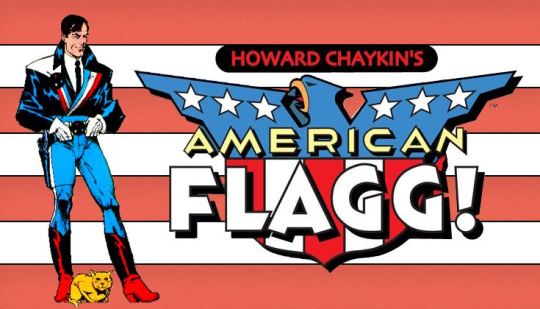
American Flagg, which ran 50 issues (October 1983 – March 1988), was one of the first titles to be published by First Comics, an early alternative press comics company founded in Evanston, Illinoisin 1983. Unusually for the time, the company offered its freelance writers and artists creator rights, including ownership of their creations. Regardless, writer-artist Howard Chaykin, then living in New York City, felt trepidation when First Comics approached him to do a project. He recalled in 2010,
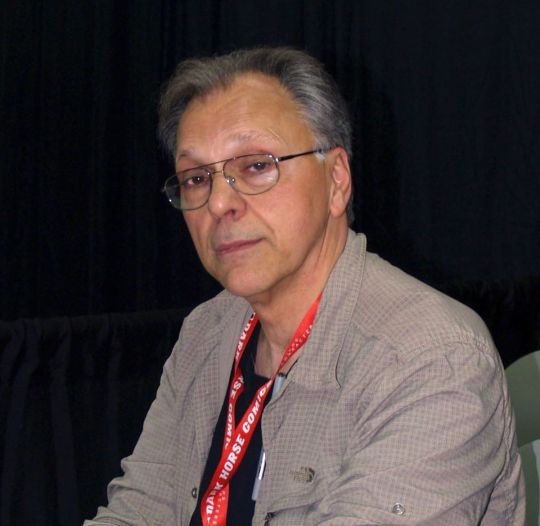
My concern had all and everything to do with the fact that this was a brand new company, located in [a suburb of] Chicago. I'd always worked for companies I'd visited and had day-to-day-dealings with. [But] they talked about a financial plan that would make it possible for me to get out from under the debt I had accrued working for [publisher] Byron Preiss [illustrating early graphic novels]. It was encouraging, so I went home and concocted a scenario, a pitch document, and that was it.

Chaykin devised a series set in 2031, a high-tech but spiritually empty, consumerist world in which the American government has relocated to Mars, leaving what remains of the U.S. to be governed by the all-encompassing corporation known as the Plex. The series star is Reuben Flagg, a former TV star drafted into the Plexus Rangers and posted as a deputy in Chicago, Illinois.
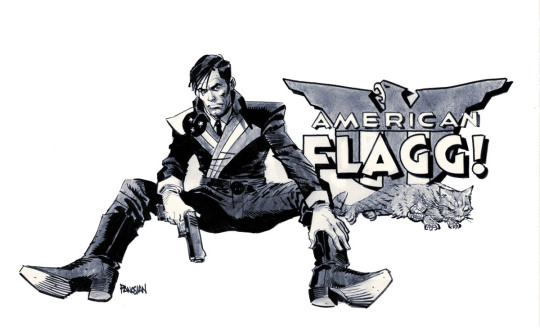
The first 12 issues, running through cover-date September 1984, consisted of four interlocking, three-issue story arcs. Chaykin recalled his difficulty in producing 28 pages of art and script monthly. "I was still a smoker and a drinker at the time. And [the output was such that] I'd never done anything like that before, and it was insane. It just devoured my life [and] I had no assistants. I didn't know how to work with an assistant at that point, and it was a very difficult process. ... I was trying to do a fairly high-quality product and I didn't want to slough it off."
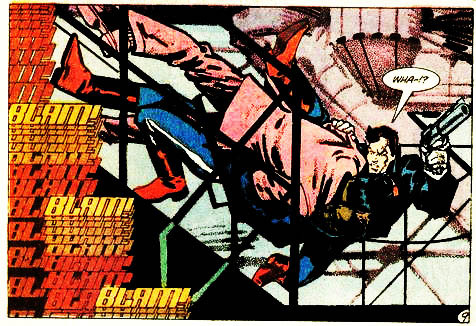
Chaykin made wide use of Craftint Duoshade illustration boards for American Flagg!, which in the period before computers, enabled him to add shaded textures to the finished art.Ken Bruzenak's lettering and logowork also won notice, as it was integral to American Flagg's futuristic, trademark-littered ambiance.
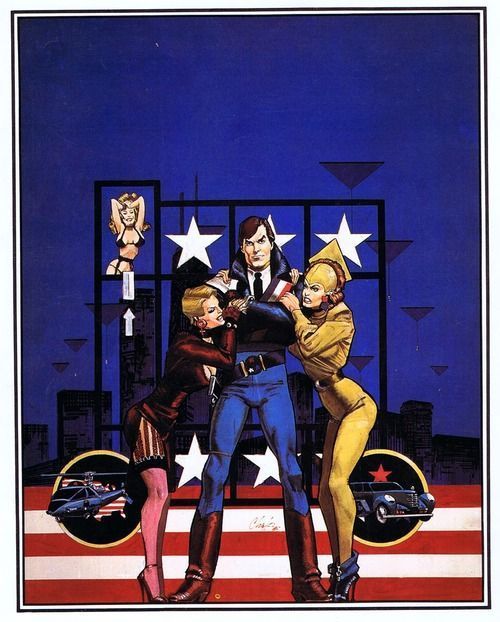
American Flagg's first dozen issues form one complete story that has influenced comic creators including Brian Michael Bendis and Warren Ellis. The comic made a huge splash at the 1984 Eagle Awards, the United Kingdom's pre-eminent comics awards. Chaykin and American Flagg! were nominated for ten awards, eventually winning seven. American Flagg! also won the 1983 Comics Buyer's Guide Fan Award for Favorite Comic Book and tied for the 1983 CBG Award for Favorite Character (Reuben Flagg).

After issue #12, Chaykin continued the series while also working on such other projects as his revamp of The Shadow for DC Comics and the graphic novel Time2, based on characters introduced in a one-off American Flagg! special in 1986. During this time, Alan Moore wrote a back-up story that ran several issues and concluded in an issue-length story.
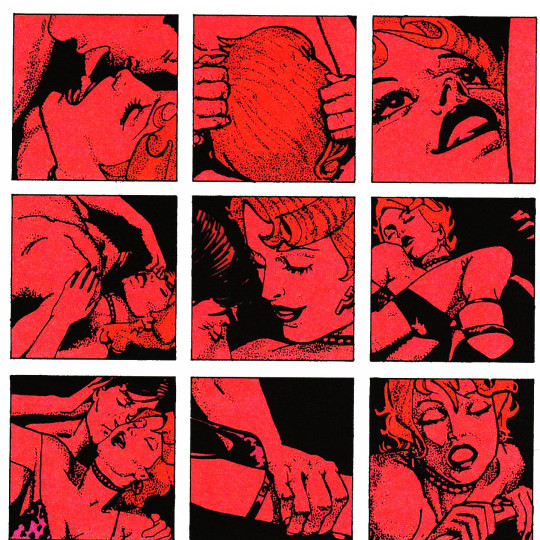
Eventually, Chaykin left, to be replaced on a regular basis by first Steven Grant then J.M. DeMatteis. Grant left after only seven issues due to creative friction with the series's new artist, Mark Badger. According to Grant, he had wanted to continue doing stories in the same style that Chaykin had established, while Badger wanted to take the series in new directions. Chaykin returned for a brief run to wrap up storylines before the first volume ended in March 1988. The title was relaunched a few months later as Howard Chaykin's Amerikan Flagg!. This run saw Chaykin return to write the first issue before handing over to John Francis Moore, with Mike Vosburg and Richard Ory penciling and inking the interior art, but the franchise failed to recapture its early success and was canceled after 12 issues.
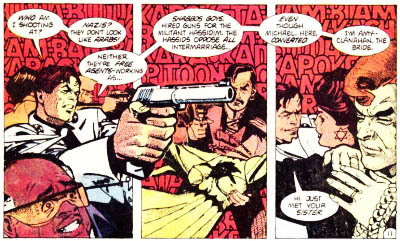
The story takes place in the year 2031, after a series of worldwide crises called the Year of the Domino (1996) has forced the U.S. government and the heads of major corporations to relocate to Hammarskjold Center, on Mars ("temporarily, of course"). In the wake of the American government leaving the planet and the Soviet Union collapsing from Islamic insurrections, there was a power shift throughout the world, with Brazilian Union of the Americas and the Pan-African League becoming the new superpowers on Earth.
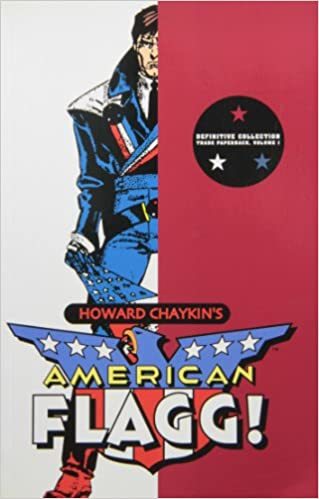
However, the exiled American government, its corporate backers, and a group of technicians in the defected Soviet lunar colony of Gagaringrad form the Plex: a giant, interplanetary union of corporate and government concerns that conduct commerce and govern the United States from its capital on Mars. Many population centers are grouped around massive, fortified arcologies called Plexmalls and the law is enforced by the Plexus Rangers, the absentee Plex's Earthside militia.
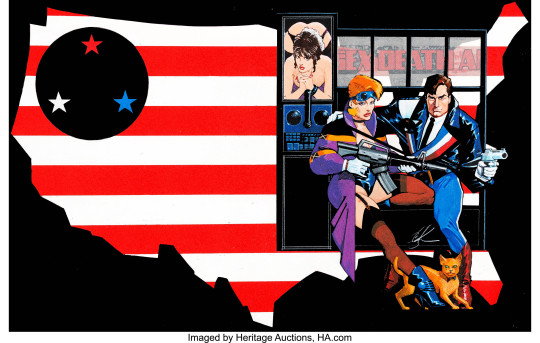
The Plex has formed the Tricentennial Recovery Committee, to get America "back on track for '76", but the TRC is in reality a plan to sell the United States off to the new superpowers and to leech off the remaining inhabitants before gaining true self-sufficiency. As a result, the Plex has outlawed non-combat related education, organized sports such as basketball and personal aircraft, restricted media to only one outlet, the Plex itself (although it has multiple channels), and advocates and glorifies the use of political violence amongst independent policlubs by providing money and firearms for its hit TV show Firefight All Night LIVE!, and covertly sterilizes the population by using a combination contraceptive and antibiotic called Mañanacillin to reduce the population.
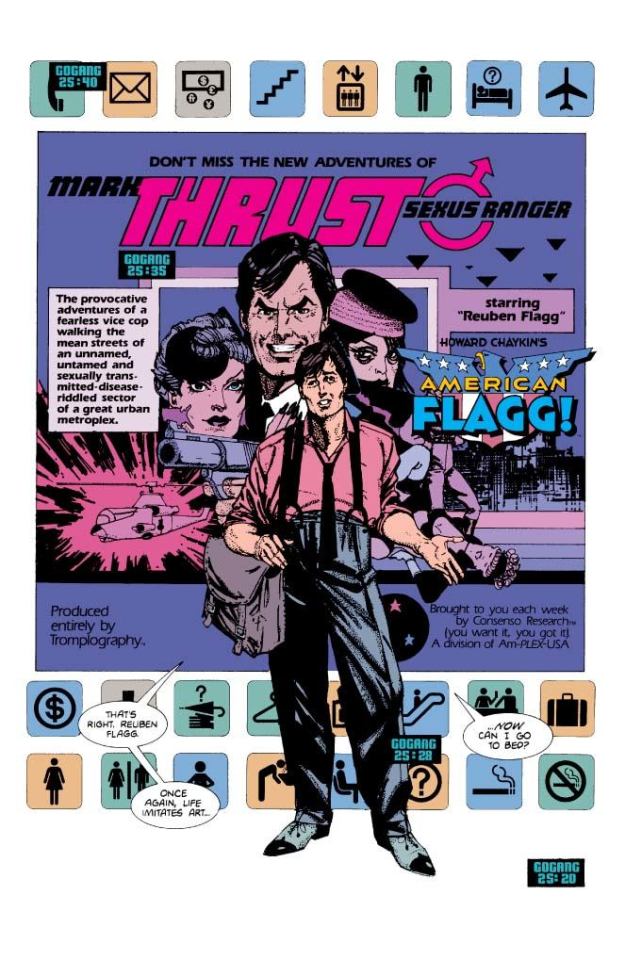
This all changes when former television star Reuben Flagg is drafted and transferred to Chicago's Plexmall to replace the local Ranger Hilton "Hammerhead" Krieger's fallen partner. He witnesses widespread graft and corruption throughout the Plexmall, but also a series of subliminal messages implanted in a television show that are causing outbreaks of gang violence. After he uses his emergency powers to interrupt the broadcast, he not only ends the violence, but also brings forth a series of events that causes the Plex to send in covert agents, the death of Hilton, and the unveiling of Q-USA, a secret TV station owned and operated by Krieger that opens Flagg's eyes to the nature of the Plex.
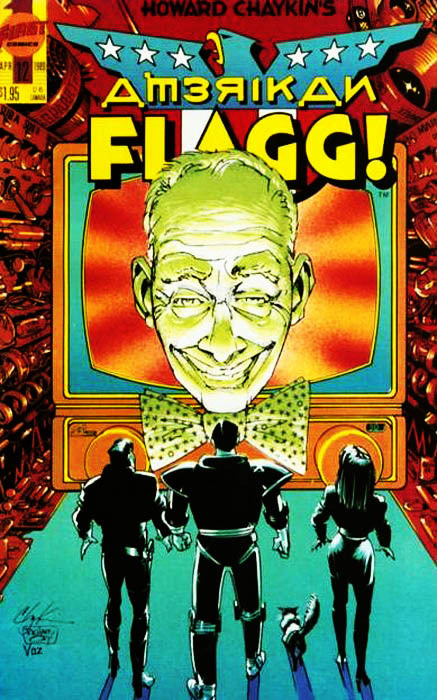
As the series progressed, Chaykin took less and less of a direct role in scripting and plotting the stories out, and by the third year of its run, he really had nothing to do with the book other than cover art. Stories began to violate the rules that Chaykin had explicitly stated in the writer's bible for the series (for instance, California was said to have slid into the Pacific Ocean, but in the final year of the book, California was merely shown to have been abandoned for reasons that were vague at best), and characterizations began to drift considerably as well. (Among other things, Flagg abandoned his interest in 1930s jazz, and was frequently shown listening to late-1960s rock, as well as becoming more of a traditional stern-jawed good-guy hero). After trying and failing several times to shore up declining interests, First Comics decided to lure Chaykin back into the writer's seat. "American Flagg!" wrapped up its principal storyline with issue #50. By this time, Reuben Flagg had traveled to Mars, overthrown the Plex, and become President of the United States. He then decided to separate Illinois from the United States and run it as his own personal fiefdom. All issues of this series took place in the year 2031.
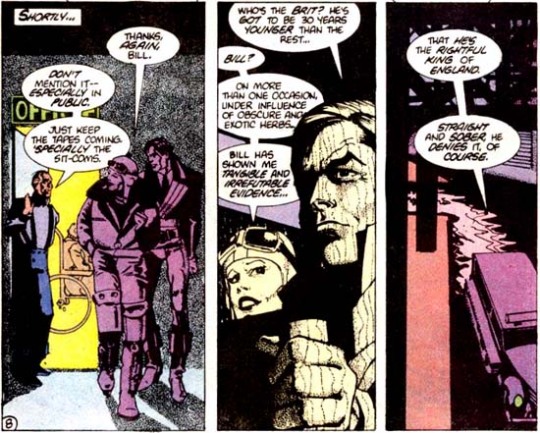
The next year, the comic was re-launched under the name Howard Chaykin's Amerikan Flagg! (The "K" and a reversed "r" were to reflect the fact that most of this series took place in Russia) and picked up from where the earlier book had left off (in 2032). There is some difference of opinion as to whether this new book was intended to be a limited run, or open-ended as is the norm with comics. In either case, it ended after twelve issues. The final issue ends with a photo album of the Flagg's future domestic life, with lots of kids, a screaming shrew of a wife, and a balding, overweight Flagg.
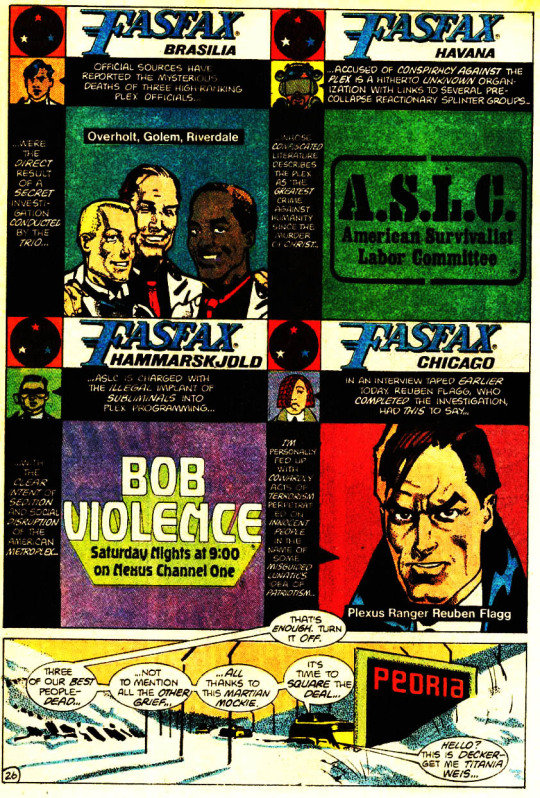
Characters
Reuben Flagg, born in 2000 at Hammarskjold Center, Mars, to Axel and Rebecca Flagg, was a stand-up comic and popular television star of the show Mark Thrust, Sexus Ranger. After he was made superfluous by CGI technology, he joined the Plexus Rangers and emigrated to Earth, being stationed in the Chicago Plexmall. Flagg is Jewish, and his parents' "undesirably bohemian" attitudes have given him an idealistic view of the United States that runs contrary to the Plex. He has a desire to set things right again, and through inheriting Q-USA, begins to set on that path.
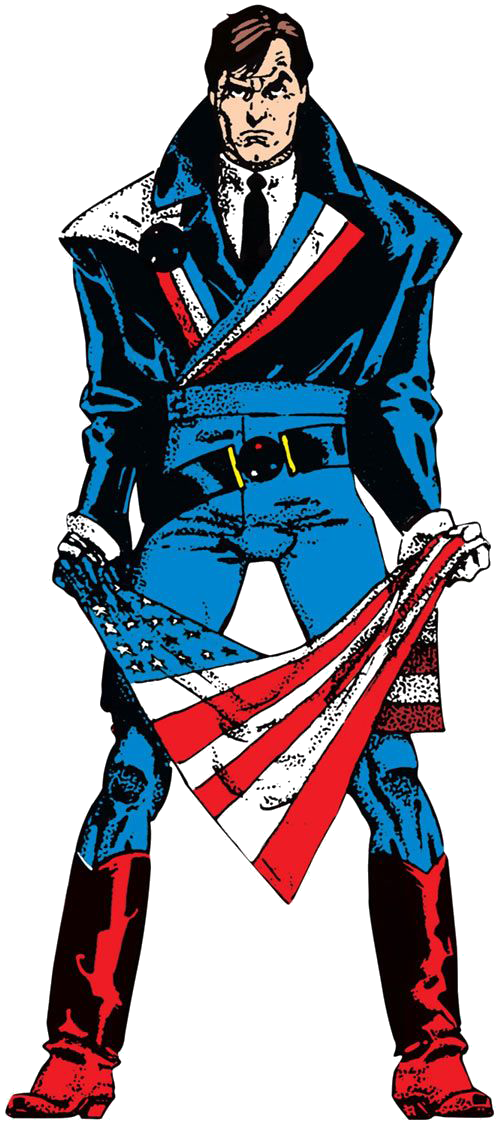
Raul the cat, an intelligent, talking orange tabby housecat. With the exception of his intelligence and his ability to speak (an ability whose origin is never explained), he appears to be otherwise a normal house pet. However, he has a customized set of cybernetic gloves, designed by Mandy Krieger, that give him opposable thumbs.
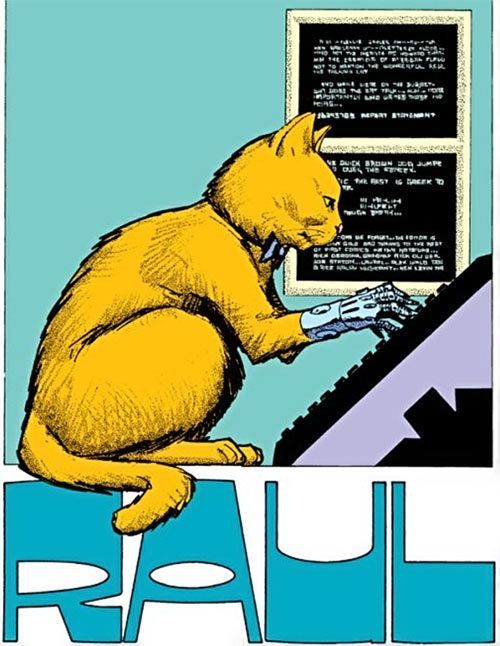
Hilton "Hammerhead" Krieger, was Flagg's superior at the Chicago Plexmall. A co-founder of the Genetic Warlords motorcycle gang along with Charles Blitz, but after his 13th arrest, the Plex drafts him because of his criminal experience. Intending to take advantage of the fledgling organization, he meets his future wife Peggy and stays with the Rangers. He does not trust anyone, not C.K., the mayor, not his wife Peg, not his daughter Mandy, and, while a Plexus Ranger, he especially does not trust the Plex. He runs an underground television station called Q-USA that broadcasts illegal sports, pornography, and pre-collapse movies and television shows. He is killed by a Plex secret agent, and his cat Raul gives Flagg the keys to the station. He also leaves behind a video explaining to his "heir" the truth of the Plex and the rules he wishes his successor to follow.
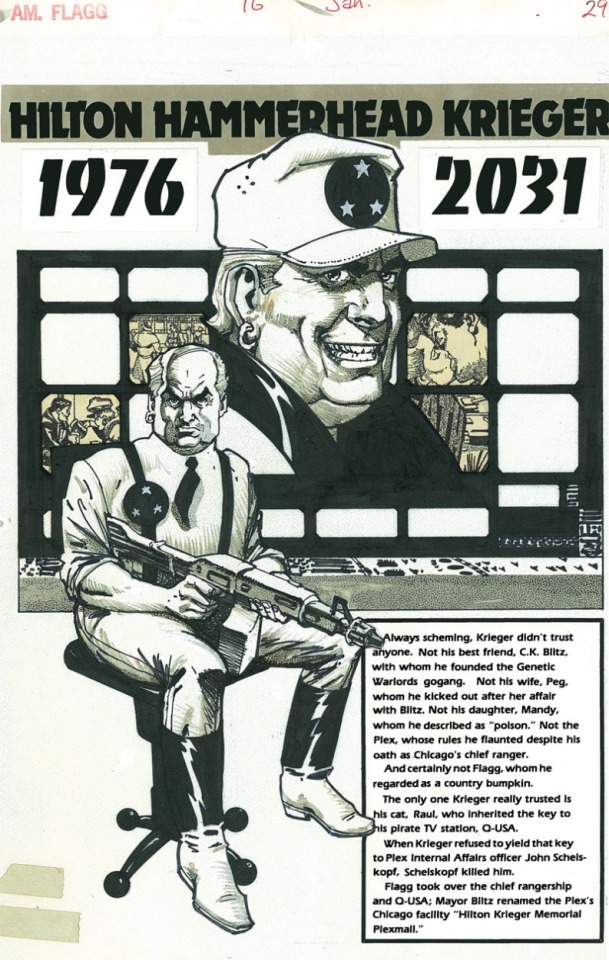
Amanda "Mandy" Krieger, daughter of Hilton, she is the air traffic controller for O'Hare Chicago Plexport. However, since the O'Hare Plexport only receives two flights a week, Mandy spends her time tinkering with electronics or getting into mischief. She later becomes a deputy to Flagg.
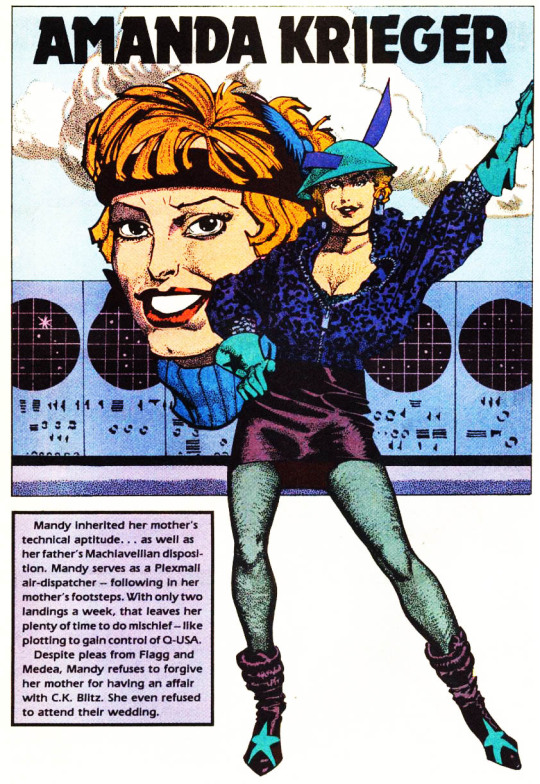
Jules "Deathwish" Folquet, captain of the Skokie Skullcrushers basketball team. Despite his punk appearance, his hulking size and the extreme nature of the sport he plays, Jules is quite intelligent. He is referred to as the "king of the two finger lobotomy." He first teams with Flagg to resolve a hostage crisis, but later forms the Video Rangers auxiliaries, and then becomes a Ranger deputy. He also later hosts a talk show with Raul called the "Him and It Show". In the second series, he renounces his violent ways, and, through a remarkable series of events, becomes Pope.
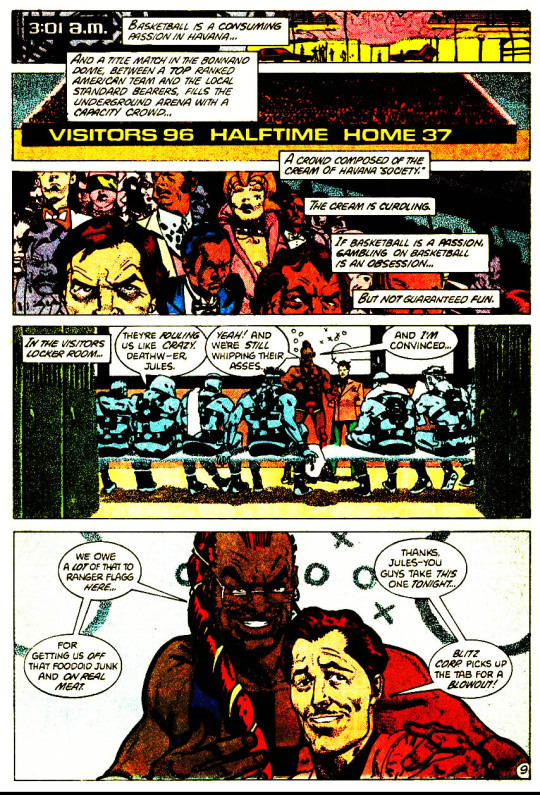
Charles Keenan Blitz, also known as The Honorable C.K. Blitz, a co-founder of the Genetic Warlords along with Hilton Krieger, also ended up getting drafted into the Plexus Rangers, but ended up leaving to become mayor of Chicago. Blitz has his hand in every deal, regardless of how illegal it may be; is extremely wealthy and corrupt; and has killed political opponents. As a side venture, he runs the Skokie Skullcrushers blackmarket basketball team. He is usually flanked by his two robot bodyguards, Bert and Ernie, named after "a private joke no one under 40 understands". He has had affairs with Mandy Krieger and with Peggy Krieger, while Hilton was fighting a brushfire war in Carracas, which lead to her being kicked out by Hilton and giving birth to...
Medea Blitz, the offspring of C.K. and Peggy. Early in the series, Medea is a wild child and hangs out with Cyril Farid-Khan, gang leader of current Genetic Warlords. She has a secret affair with Hilton Krieger, but after his murder, is considered a suspect and is involved in a traffic accident, which causes her to miscarry Krieger's child. In order to clean up her act, C.K. Blitz has her join the Plexus Rangers to straighten her out. As the series progresses, Medea is shown to become more and more accepting of the Rangers and becomes a decent team player in Flagg's group.
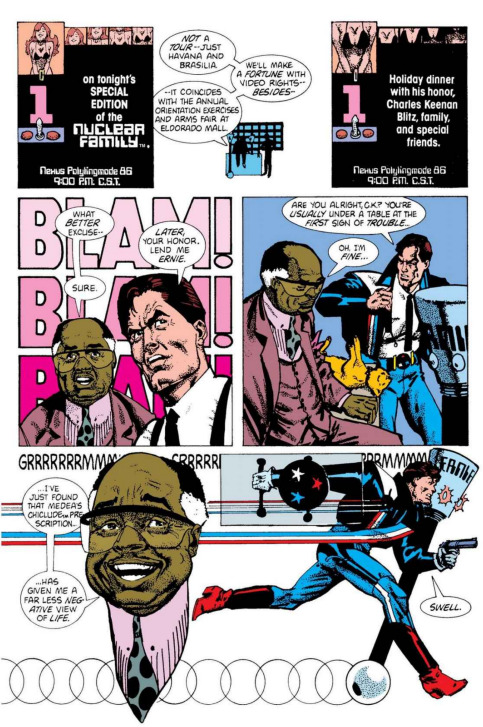
Sam Luis Obispo also known as Ned Beaumont, also known as Tom Slick. A hustler Reuben meets in Havana while escorting the Skokie Skullcrushers, he later partners with Flagg for most of his time in South America. He has an affair with the wealthy daughter of the Brazilian ambassador, which causes all sorts of problems for Flagg and himself.
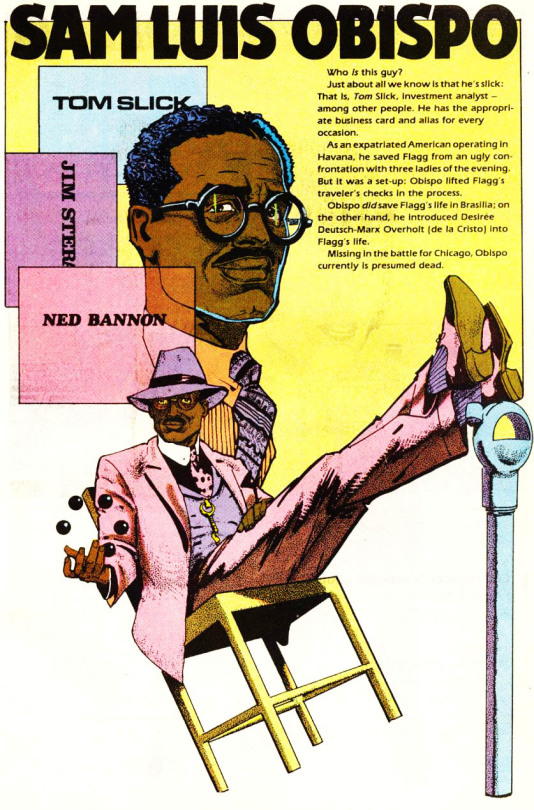
William Windsor-Jones, but his best friends just call him Bill. Bill is the youngest member of the Witnesses, a gang of octogenarian rebels. He helps Flagg out from time to time, giving him intelligence and technical support. He later has become a newscaster for Q-USA. Bill is Prince William, and the rightful heir to the now-abolished British throne.
Luther Ironheart, a robotic Plexus Ranger with a head that consisted of a holographic projection. Assigned to be Reuben Flagg's partner on patrol. While not very bright, he exhibited superhuman strength and agility.
#american flagg#american flagg!#mark thrust#howard chaykin#dystopia#dystopian#1983#silversteel rocks#first comics#howard chaykin's american flagg#bob violence#mojo el diablo#comic tropes#overlord comics#strange brain parts#reuben flagg
7 notes
·
View notes
Note
RA RA RASPUTIN LOVER OF THE RUSSIAN QUEEN
The World Snooker Championship is an annual cue sport tournament and is the official world championship of the game of snooker.[1] The sport of snooker was founded in the late 19th century by British Army soldiers stationed in India.[2] The sport originated by players from the United Kingdom, and later players from Europe and the Commonwealth. In more modern times, the sport has transferred to being played worldwide, especially in East and Southeast Asian nations, such as China, Hong Kong and Thailand.[3]
The world championship sees 32 professional and qualified amateur players compete in one-on-one snooker matches in a single elimination format, each played over several frames. The 32 players for the event are selected through a mix of the world snooker rankings, and a pre-tournament qualification round.[4][5] The first world championship in 1927 was won by Joe Davis, the final being held in Camkin's Hall, Birmingham, England.[6][7] Since 1977, the event has been held in the Crucible Theatre in Sheffield, England.[8]
Stephen Hendry is the most successful player in the modern era, having won the championship 7 times.[9] The previous year's championship was won by Wales' Mark Williams, who won the event defeating Scotland's John Higgins in the final 18–16.[10][11] This was Williams' third championship, having won in 2000 and 2003 previously. The winner of the 2019 event earns prize money of £500,000, from a total pool of £2,231,000.[12]
Format
The 2019 World Snooker Championship was held between 20 April and 6 May 2019 in Sheffield, England. The tournament was the last of twenty rankings events in the 2018/2019 season on the World Snooker Tour. It featured a 32-player main draw to be played at the Crucible Theatre, as well as a 128-player qualifying draw which took place at the English Institute of Sport from 10 to 17 April 2019, finishing three days prior to the start of the main draw. This was the 43rd consecutive year that the tournament was held at the Crucible, and the 51st consecutive year the championship was contested through the modern knockout format.[4][5]
The top 16 players in the latest world rankings automatically qualified for the main draw as seeded players.[a] Defending champion Mark Williams was automatically seeded 1st overall. The remaining fifteen seeds were allocated based on the latest world rankings (revision 10), which were released following the China Open, the penultimate event of the season. Matches in the first round of the main draw were played as best of 19 frames. The number of frames needed to win a match increased with each successive round, leading up to the final match which was played as best of 35 frames.[4][5]
All 16 non-seeded spots in the main draw were filled with players from the qualifying rounds. The qualifying draw consisted of 128 players, including 106 of the remaining 112 players on the World Snooker Tour, as well as twenty-two wildcard places allotted to non-tour players. These invited players included the women's world champion, the European junior champion, and all four semi-finalists at the amateur championship. As with the main draw, half of the participants in the qualifying draw were seeded players. Players ranked from 17th to 80th were allocated one of 64 seeds in order of their ranking, while all of the other participants were placed randomly into the draw. To reach the main draw at the Crucible, players needed to win three best of 19 frame matches.[13][4]
Participant summary
Eight former world champions participated in the main tournament at the Crucible. They were Ronnie O'Sullivan (five titles: 2001, 2004, 2008, 2012, 2013), John Higgins (four titles: 1998, 2007, 2009, 2011), Mark Selby (three titles: 2014, 2016, 2017), Mark Williams (three titles, and defending champion: 2000, 2003, 2018), Shaun Murphy (one title: 2005), Graeme Dott (one title: 2006), Neil Robertson (one title: 2010), and Stuart Bingham (one title: 2015).[4] This was O'Sullivan's 27th consecutive appearance in the final stages of the World Championship since his debut in 1993, equalling Stephen Hendry's 27 consecutive appearances, and three short of Steve Davis's record of 30 total appearances. Four other former world championship finalists also competed: Ali Carter (twice: 2008 and 2012), Judd Trump (once: 2011), Barry Hawkins (once: 2013), and Ding Junhui (once: 2016).[13][4] The youngest player to participate in the main stage of the tournament was Luo Honghao at 19 years of age,[14] while 46-year-old Mark Davis was the oldest; both players entered the main draw through qualifying.[15]
Three former world champions participated in the qualifying rounds: Ken Doherty (1997), Peter Ebdon (2002) and Graeme Dott. Of these, only Dott succeeded in qualifying for the main tournament at the Crucible. Also, four former world finalists participated in the qualifying rounds: Jimmy White (six times: 1984 and 1990–1994), Nigel Bond (once: 1995), Ali Carter, and Matthew Stevens (twice: 2000 and 2005).[13][4] Of these, only Carter qualified for the main tournament at the Crucible.[13]
Tournament summary
Qualifying rounds
James Cahill
became the first-ever amateur to qualify for the World Championship main stage at the Crucible.
The top sixteen seeds automatically qualified for the main competition.[4] The defending champion Mark Williams is seeded first, whilst other seeds are allocated based on the world rankings following the 2019 China Open.[4] All the other players competed in the preliminary qualifying rounds, and were required to win three best-of-19 matches to reach the finals.[4]
The qualifying rounds took place at the English Institute of Sport in Sheffield from 10 to 17 April 2019, with 16 players progressing to the finals. 128 players competed in the qualifying stage, including those tour players not automatically qualified for the main competition and invited amateurs.[16]
James Cahill became the first amateur player ever to qualify for the Crucible main stage of the World Championship, defeating fellow amateur Michael Judge 10–6 in the third qualifying round.[17] Seven players – the highest number since 1999 – made it through the qualifying rounds to make their debuts at the main stage of the tournament. Besides Cahill, they were Scott Donaldson, Michael Georgiou, Li Hang, Luo Honghao, Tian Pengfei and Zhao Xintong.[18] 2006 World Champion Graeme Dott and two-time finalist Ali Carter also qualified for the main stage.[18]
First round
The draw for the first round of the championship was made on 18 April 2019, the day after the conclusion of the qualifying rounds and two days before the start of the main event; the matches were drawn by World Snooker chairman Barry Hearn, and 1991 World Champion John Parrott.[19] The first round of the championship took place from 20-25 April 2019. Each first round match was played over two sessions as best-of-19-frames.[20]
Top half
The tournament began with defending champion Mark Williams (seeded 1) drawing Martin Gould.[21][22] Gould took the first frame of the match, with a break of 64, before Williams won the next five with breaks of 55, 54 and 129 to lead 5–1.[23] Gould won both frames 7 and 8, before Williams took the final frame of the session with a break of 97 to lead 6–3.[23][24] The second session was also played on the opening day of the event. In frame 10, Williams opened up a lead, before Gould made a clearance to force a respotted black, but it was Williams who potted the black to lead 7–3.[25] Gould won frame 11, to trail 4–7, before Williams won the next two frames to go ahead 9–4.[24] Gould fought back with breaks of 70, 87 and 76, to trail 7–9, before Williams won the match 10–7, clinching a "nervy" 17th frame.[24] After his victory, Williams complained that World Snooker had not allowed his child backstage before the match, which the governing body denied.[26]
Shaun Murphy
(seeded 13) completed the second ever whitewash at the World Championship main stage at the Crucible.
Shaun Murphy drew event debutant Luo Honghao. The match would be only the second whitewash ever at the Crucible, and the first since John Parrott defeated Eddie Charlton in 1992, finishing 10–0.[27] Luo scored the lowest number of points scored in a World Championship match, scoring just 89 during the entire match, more than 100 points lower than the previous record low of 191 scored by Danny Fowler when he lost 1–10 to Stephen Hendry in 1993.[27] Neil Robertson met Michael Georgiou in the first round; Georgiou trailed 0–9 at the conclusion of the first session, having scored even fewer points than Luo in those frames. However, Georgiou won frame 10 on resumption of play in the second session with a break of 90, to avoid both the whitewash and low points total. Robertson later won 10–1.[27]
Fifth ranked John Higgins played Mark Davis, with Davis having defeated Higgins in six of the pair's last seven encounters.[28][29] Higgins gained a 6–3 lead after his initial session, before spending the night in Royal Hallamshire Hospital because his brother Jason had fractured his kneecap by falling down the stairs at the venue. Higgins then won the match the following day 10–7.[30]
Two former winners of the event, Graeme Dott (2006 winner) and Stuart Bingham (2015 winner), met in the first round of the competition. Bingham led 8–1 after the first session, and later 9–4, before Dott won five frames to level the match at 9–9. Bingham won the deciding frame after Dott missed a simple black ball shot.[31] Following the match, Dott stated that "serious sleeping problems" had caused him issues playing.[32]
Bottom half
Qualifier
Gary Wilson
won the longest ever World Championship frame at the Crucible in the first round decider against
Luca Brecel
.
The match between Gary Wilson and Luca Brecel, which featured a large amount of tactical play, had to be suspended when the afternoon session overran with Wilson leading 9–8.[33] When the match resumed in the evening, Brecel won frame 18 to send the match to a deciding frame. This frame first required a re-rack, then set the record for the longest frame ever played at the Crucible, at 79 minutes and 31 seconds.[b][33] After leading 6–3 overnight, Ding Junhui defeated Anthony McGill 10–7.[34]
Having lost in the first round eight times in his previous 15 appearances at the Crucible, Stephen Maguire played debutant Tian Pengfei. In frame 17, Maguire was 7–9 down and needed a snooker on the colours to stay in the match. He won a snooker on the blue, then missed a risky pot to a baulk corner, which he missed, but the blue hit the cue ball again and went into another baulk pocket, a shot later called "an outrageous fluke" by Maguire.[35] He added pink and black to steal the frame, and then took the next two frames to win 10–9.[36] Former three-time winner and world number 2 Mark Selby played debutant Zhao Xintong. Despite having been behind 1–5 after the first six frames, Selby won nine of the next eleven frames with two breaks of 131 to win 10–7.[15]
Amateur player James Cahill drew the world number one Ronnie O'Sullivan, who had been in the final of both Triple Crown events earlier in the season. Cahill took the final frame of the first session to lead 5–4, and took an 8–5 lead in the second session, before O'Sullivan tied the match up at 8–8.[37] Cahill made an early break in frame 17, but fell apart on a simple red; O'Sullivan simply needed the final pink and black to win the frame, but missed the pink, allowing Cahill to take the frame. Cahill won the match 10–8 with a break of 56 in the final frame.[38] The win was Cahill's second win over the first ranked player in the season, having defeated Mark Selby in the first round of the 2018 UK Championship earlier in the season.[39] O'Sullivan commented after the match that he had been unwell during the match, however former champion Ken Doherty accused O'Sullivan of "playing too casually".[40]
Second round
The second round of the championships was played between 25 and 29 April, with matches being competed over three sessions as best of 25 frames. The initial session of the match between Shaun Murphy and Neil Robertson featured a maximum break attempt by Murphy.[41] With just the last two reds remaining, Murphy asked for the divider between the tables to be removed to allow all spectators to see the break attempt; however, Murphy would fail to finish the break.[42] Robertson won the initial three frames of the match, without Murphy attempting a pot, and led at both 5–3 and 10–6 after the first two sessions.[43] Robertson later won the first three frames of the final session to win 13–6.[44] Post match, Murphy called Robertson "just too good" and "unplayable".[44]
16th seeded
David Gilbert
defeated the defending champion
Mark Williams
in the second round. He went on to reach the semi-finals.
Defending champion Mark Williams played David Gilbert. After the first session, with Gilbert leading 5–3,[45] Williams stated that he had suffered chest pains post session.[46] He was taken to Northern General Hospital overnight, but returned for the second session of the match, the following day.[46] Williams later tied the match at 7–7, but trailed 7–9 after the second session.[47] Gilbert then won the first four frames of the final session to win 13–9.[48][49]
Amateur player James Cahill drew fifteenth seed Stephen Maguire. Maguire led 5–3 and 9–7 after the first two sessions.[50] Cahill took three of the first four frames in the third session to draw level at 10–10. Cahill then won frame 21, to take the lead for the first time in the match, with Maguire drawing level in the following frame.[51] Frame 23 saw both players miss shots, with Cahill looking to win the frame before being penalised for a waistcoat foul, and later going in-off from a cannon, allowing Maguire to take the frame. Cahill won frame 24, after Maguire missed a green ball by a wide margin.[52] In the deciding frame, Maguire won the match 13–12.[51][53]
Three-time champion Mark Selby played qualifier Gary Wilson, but trailed 3–5 after the first session, before winning four out of the first five frames in the second session to lead 7–6. Wilson, however won the remaining three frames of the session to lead 9–7.[45] Selby later tied the match at 10–10, before Wilson won the next three frames to qualify for the quarter-finals.[48][54] 2013 runner-up Barry Hawkins won the first four frames of his match with Kyren Wilson,[21] with the first session finishing 6–2 to Hawkins. Hawkins made four century breaks of 105, 130, 111, and 137 including a maximum break attempt.[42][55] Wilson also made a century break in frame 5, with four frames being won with a century in a row for the first time since Ronnie O'Sullivan and Stephen Hendry in 1999.[55] Wilson, however, won the second session of the match 5–3 to trail 7–9, before drawing level at 9–9 in the final session.[56] Despite Hawkins taking leads at 10–9 and 11–10, Wilson won the last three frames to progress, winning 13–11.[57] The match saw a record equalling 9 century break for a second round match at the world championships.[58]
Zhou Yuelong played Ali Carter in the only all-qualifier tie of the second round. Zhou took four of the first five frames to lead 4–1, then led after the first session 5–3, and held the lead at 9–7. On resuming the match in the final session, Carter won six straight frames to win 13–9.[57] Two former finalists, Judd Trump and Ding Junhui met in the second round. Trump lead 5–1, with Ding winning eight of the next ten frames to lead 9–7. Trump won the next 6 frames with breaks of 93, 79, 54 and 103 to win 13–9.[59]
Quarter-finals
The quarter-finals were played on 30 April and 1 May, and similar to the previous round, matches were played as best of 25 frames across three sessions. In an all-qualifier match, Ali Carter played Gary Wilson. Despite playing in his first world championship quarter-final, and losing the first three frames of the match, Wilson won five straight frames to lead 5–3 after the first session.[60] The pair shared the next session, with both players winning four frames, with Wilson leading 9–7 into the final session.[61] Carter won two of the next three frames, including a break of 128 to trail 9–10, with Wilson winning the next three to progress 13–9.[62][63] Post-match, Carter said "You have to take your hat off to [Wilson]. I did not think he could play that good," commenting that despite his low ranking of 32, Wilson "has to be the favourite to win it now, the way he has been playing."[60]
2019 Masters winner Judd Trump played 15th seed Stephen Maguire. Trump had won six straight frames to win his second round match against Ding Junhui, and won the first six frames of this match scoring breaks of 131, 67, 106, 78 and 101, to lead 7–1 after the first session.[64] In the second session, Trump looked set to win the match without needing to play the final session, extending his lead to 9–1, however, Maguire won four of the remaining frames to trail 5–11 by the end of the session. Trump won the match after just three frames of the final session 13–6.[65][66] Post-match, Maguire was fined for swearing in a press conference after commenting his performance was "shit".[65][67][66]
4th seed
Neil Robertson
, lost in the quarter-finals to
John Higgins
.
David Gilbert played Kyren Wilson. The two had met in the 2019 German Masters final earlier in the season, with Wilson winning the tournament 9–7.[68] The two players shared the opening session 4–4, and Gilbert won six of the eight frames in the second session to lead 10–6 overnight.[65] Wilson won two of the first three frames of the final session to trail 8–11, but Gilbert took the final two frames to win the match 13–8.[65][69]
Four-time world champion John Higgins played Neil Robertson. Robertson took an early 3–1 lead, but Higgins tied the match at 4–4. Robertson pulled away to 7–4, with Higgins winning five frames in a row to take a 9–7 lead.[65] Higgins won the match 13–10, after sharing the final session, with a century break of 101 in the final frame to win.[70][71]
Semi-finals
John Higgins
reached his third consecutive World Championship final, his career eighth.
The two semi-finals were played from 2 to 5 May, and were best-of-33-frame matches spread over four sessions. The first semi-final pitted four-time champion John Higgins against David Gilbert, who had never progressed past the second round previously.[72] Higgins took the first two frames of the match, with Gilbert tying the match at 2–2 with a break of 94.[73] Higgins led 3–2, before Gilbert won the next three frames, including a maximum attempt, potting 15 red balls, but failed a double on the black to lead 5–3.[73]
The second session saw Gilbert increase his lead to 8–3, by winning three more frames including a 125 break.[74] Gilbert was also ahead 56–17 in frame 12 but missed a frame-ball pink into the middle pocket, before Higgins cleared the table to trail 4–8. Higgins also won the next two frames with breaks of 67, 52 and 58 to trail 6–8.[74] Gilbert, however, won the final two frames of the session to lead 10–6.[75] Pundit John Virgo said "[Higgins] is not with it", with six-time champion Steve Davis calling Higgins' performance "ridiculous".[75]
On the return of the match for the third session, a member of the crowd was removed after just the break off shot in the initial frame, which was won by Gilbert to increase his lead to 11–6.[65] Higgins won two of the next three to stay at four frames behind at 12–8.[76]Frame 21 saw Higgins make a 143, the highest of the tournament, and the 86th tournament century break, tying the record for century breaks in one world championship, first set in 2015.[76] Gilbert won the next frame, falling short of a century, with a break of 91.[76]Despite this, Higgins won the final two frames of the session to trail 13–11.[77]
The final session saw Gilbert take frame 25, but Higgins won the next four frames to lead for the first time since leading 3–2 .[78] Gilbert won the next two frames, to lead 16–15, before Higgins scored a 139 break to send the match to a deciding frame at 16–16. The deciding frame was won by Higgins, after Gilbert missed the black ball from the spot.[78] Post-match, both men gave emotional press-conferences, with Gilbert commenting "I have never won anything, I have come close but this is the best couple of weeks I have had in my snooker career by a mile. It might be the closest I will come to winning the World Championship."[79] Higgins, however apologised for his poor play during the match, and bringing Gilbert "down to [Higgins]' level in the first three sessions."[80]
The second semi-final was played between Judd Trump and qualifier Gary Wilson. Trump and Wilson shared the opening session, 4–4, with Wilson later took the lead at 6–5, thanks to a break of 65. Trump won the next three frames with breaks of 73, 123 and 75 to lead 9–6 before Wilson scored a 77 to bring the score to 9–7 after two sessions.[81] The third session was "nervy" from both players.[82] Wilson won frame 17, with a break of 50.[83] However, Trump won the next three frames, including a break of 114, the 87th century of the championship, the most of all time at a world championship.[84] Wilson and Trump went into the final session with Trump 14–10 ahead.[63]
The final session of the semi-final saw Wilson win the first frame, but Trump won the remaining three frames to win 17–11.[85] Post-match, Trump suggested that despite appearing in the final, neither himself or Higgins had played particularly well.[86] World ranked 30, Wilson commented that "Judd deserved to win", but commented on the playing conditions being poor saying: "I wasn't good enough yesterday, but I've got to say that table is disgusting. It's running off all over the place, you're getting square bounces, kicks every other shot".[87][88]
Final
In a repeat of the
2011 World Championship
final,
Judd Trump
captured his maiden
World Championship title
. By doing so he also completed a career
Triple Crown
.
The final was played over four sessions, as a best of 35 frames match. The final was a repeat of the 2011 World Snooker Championship final, between John Higgins and Judd Trump, which Higgins won his fourth championship, winning 18–15.[70] Higgins defeated Mark Davis, Stuart Bingham, Neil Robertson and David Gilbert to reach the final, whilst Trump defeated Thepchaiya Un-Nooh, Ding Junhui, Stephen Maguire and Gary Wilson. In reaching the final, Higgins is competing in his third straight world championship final, having been defeated by Mark Selby in 2017, and Mark Williams in 2018. This was also Higgins' eighth final, one short of the record held by Stephen Hendry, having won four previously in 1998, 2007, 2009 and 2011.[89] This was Trump's second final, having only played in the 2011 defeat prior.[89]
The first session opened with the first two frames being won by Trump, with breaks of 51 and 63.[90] Higgins replied with a break of 139 to trail 1-2, before Trump scored a century of his own a 105 in frame 4. Brakes of 69, 34, 40 and 101 saw Higgins score 244 unanswered points and three frames on the bounce to lead 4-3.[90] Trump tied the match at 4-4 with a fourth century in the eight frames.[90] Post-session, Trump commented on the temperature of the arena, calling it too cold to which tournament officials denied.[91]
Frame 9 saw Higgins score a break of 125 to move to 5-4 ahead, the third century in a row for the match.[92] Trump won the remaining frames of the session, eight in a row, including breaks of 135 and 114.[93] Trump finished the session leading by seven frames overnight, leading 12-5. Six time champion Steve Davis commented on the session saying "I've seen some astonishing snooker here, a lot of it from Ronnie O'Sullivan, but that was a different type of astonishing. I am a little bit in shock. He is making a lot of very difficult shots seem very easy."[94]
The third session opened with a maximum attempt from Higgins, who potted 14 reds and blacks before running out of position for the red ball. Higgins played a full table double, but missed the following black. Higgins also won frame 19, to trail 7-12, but Trump would win the next three to extend his lead to 15-7.[95] Higgins won the following two frames, to prevent the match from being won a session early. Frame 23 saw Trump attempt a maximum break of his own, but overcut a red ball into the middle pocket.[95] Leading 16-9 going into the final session, Trump won the first two frames of the evening session to win 18-9.[96] The win was the biggest margin of victory since 2009, when Higgins defeated Shaun Murphy by the same score.[97]
With 11 centuries between them, the final set the record for the most 100+ breaks in one match, one more than the previous record held by Alan McManus and Ding Junhui in the semi-final of the 2016 event.[98]
9 notes
·
View notes